Driving Course
1/363
There's no tags or description
Looks like no tags are added yet.
Name | Mastery | Learn | Test | Matching | Spaced | Call with Kai |
|---|
No analytics yet
Send a link to your students to track their progress
364 Terms
Accident (2)
Can incorrectly imply that the event’s was random and without cause.
Implies no driver was at fault or incident did not have a cause or who would be held legally responding for the event.
Crash or Collision
more accurately reflect the fact that such events are preventable and that they are caused, most often by drivers.
Rear-end collisions are among…
…the MOST FREQUENT types of collisions and ARE PREVENTABLE.
READ
Right speed for rn.
Eyes up, brain on
Anticipate their next move
D big donut of space around you (keep huge amount of space around ur vehicle)
Highway Transportation System
A complex system of federal, state, local, and individual systems functioning together to provide reduced-risk and lawful driving environment
Three compliments of Highway Transportation System (HTS)
Roadways
Vehicles
Drivers & other road users
Risk
Chance of injury, damage or loss associated with driving situation.
3 steps to reducing risk
Perceive
Decide
Act
Graduated Driver Licensing (GDL) (3)
An approach to ease new drivers into safe driving by providing practice and skill development under low-risk conditions.
Allows new drivers to gain experience under relatively low-risk conditions, before driving alone in higher-risk conditions.
New drivers gradually proceed through stages of licensing before becoming fully licensed.
How long it takes a new driver to reach the driving ability of average experienced driver
5 years of driving
Drivers should develop habit of searching _____ seconds ahead their path for objects and conditions that could increase risk
20 to 30 seconds ahead
What to do with cell phone during driving lesson
Turn cell phone off and place out of sight
Nearly ___ of all new drivers = charged with traffic offense or involved in crash during first 12 months of licensed driving
One half of all new drivers
Teen driver’s chance of crashing is higher when driving between ______
9pm and 6am
What % of crashes = caused by driver error
90%
Primary factors involved in teen crashes (3)
Failing to yield the right of way
Driving too fast for road conditions
Being distracted
Successfully completing a drivers education ______ guarantee that you become a safe driver
DOES NOT
New drivers tend to ______ the risks involved in driving on any road
Underestimate
Pre driving checks should be checked ______ you drive
CHECKED EVERY TIME
Check under the hood at least
Once a month
You are walking in a parking garage. Walk ____________ to ensure other drivers see you.
Well away from other vehicles
When parked along a curb, approach the vehicle _______ as you approach the driver’s door
Facing traffic
Each item you should inspect/clean/repair prior to driving (9)
Windshield
License plate
Side & rear mirrors
Brake lights
Taillights
Tires
Turn signals
Headlights
Vehicle safety tech system sensors
Most likely to notice fluid leaks
Underneath the vehicle
When inspecting tires, check for the way the _________
Front wheels are pointed
If you don’t straighten the wheels so they point forward before moving the vehicle, the vehicle will
Immediately turn
What to remember about keyless ignitions (4)
Be 100% sure vehicle is turned off when done driving
Put vehicle in park before getting out of it
“Shift and shut off”
Share this concern with other family members and friends
In vehicles in which the seats = manually adjustable, the controls are located (2)
Forward/ back adjustment lever: typically under driver’s seat, toward front.
Seat back angle adj. lever / knob: typically at left rear side of driver’s seat.
When using steering wheel, hands should be in ____&____ position
but if you feel fatigued, use ___&____
9
3
8 & 4
How to grip steering wheel (2)
Grip wheel by outside of rim, using both hands
Use ur fingers instead of palms of hands & keep thumbs along face of steering wheel (more control)
Blind spots located (2)
Off rear corners of vehicle
Directly behind vehicle
Adjust rear view mirror so that it shows ___ rear window.
should only require you to move your_____ not your _____
Entire
Eyes
Head
Check your rear-view mirror when (4)
You slow down
You stop
Near bottom of long downhill section of roadway/grade
After turning onto a street
Never leave something hanging from your ______ while driving
Rear-view mirror
Set the mirror so you can barely see your car on the side ____________
closest to the car
After properly positioning their mirrors, drivers must still _______
turn head and glance so they can verify the space
Head checks are necessary (3)
Before changing lanes
Before turning if there are bicyclists riding in a bike lane to your side
Before merging/ entering a highway
If green traffic signal could change to yellow, do this
Hover right foot over brake pedal so you can brake immediately if it turns yellow
If pedestrian or bicyclist seems to be getting near your lane, move to
Left side of lane
When approaching toll booth (3)
Pick a lane early and stay in it
Slow down
Be cautious for drivers changing lanes
Safety belts reduce chance of being killed in a crash by ____%
25%
As a passenger, it is ____ okay to ___ the seat back to take a nap
NOT
RECLINE
When a school bus is stopped and its red lights are flashing, it is a violation to ___________________
Overtake that bus from the REAR or from the FRONT
Air bag locations (2)
Steering Wheel
Passenger Side Dash
Airbags might also be mounted (3)
On side of vehicle’s interior
In center, between two front occupants
On back of front seats
Drivers should sit ______ inches from the steering column while passengers should sit ______ inches from the dashboard
10-12 inches
15-18 inches
Active restraint system = _____
Passive restraint system = _____
seatbelt
Airbag
It is _____ okay for a front passenger to ever put their feet up on the dash (airbag could crush their legs back into their body)
NEVER okay for a front passenger…
Never place rear-facing infant seat in ________ seat protected by an airbag unless airbag=shut off
Front passenger seat protected by an airbag.
Elderly passengers should ride with passengers seat
Moved as far back as possible to protect them from airbag deployment injuries
It is ______ to drive with ur pet in ur lap
NEVER okay to drive with ur pet in ur lap.
Gear Selector Level location
Usually located on right side of steering column or on console between front seats.
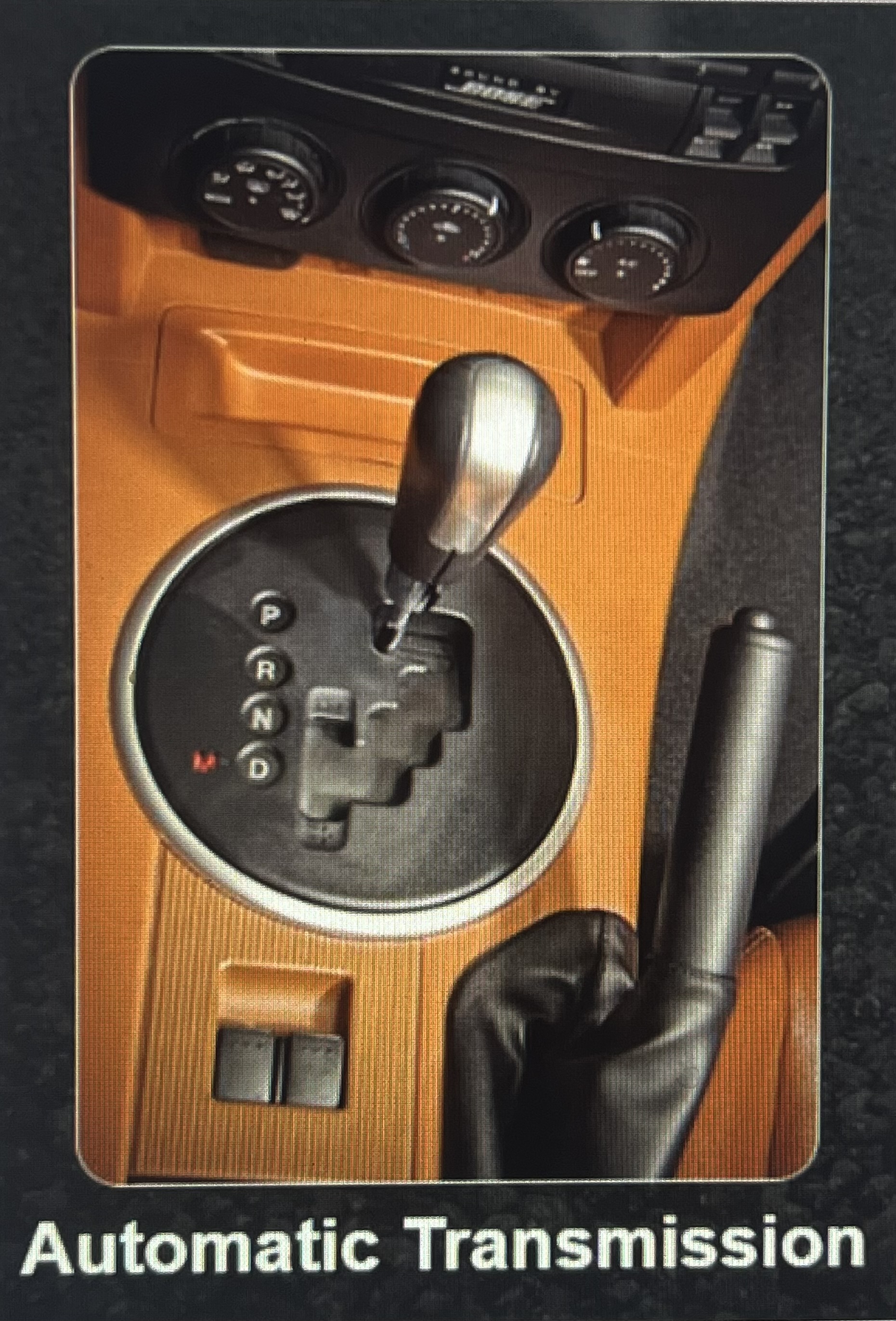
Use only _______ on pedals to help with coordination and smoothness
RIGHT FOOT on pedals
Accelerator Pedal location & purpose & special fact (3)
Location: Front right corner of driver’s footwell.
Vehicle’s speed = controlled by accelerator pedal.
Pressure applied to pedal determines speed of vehicle.
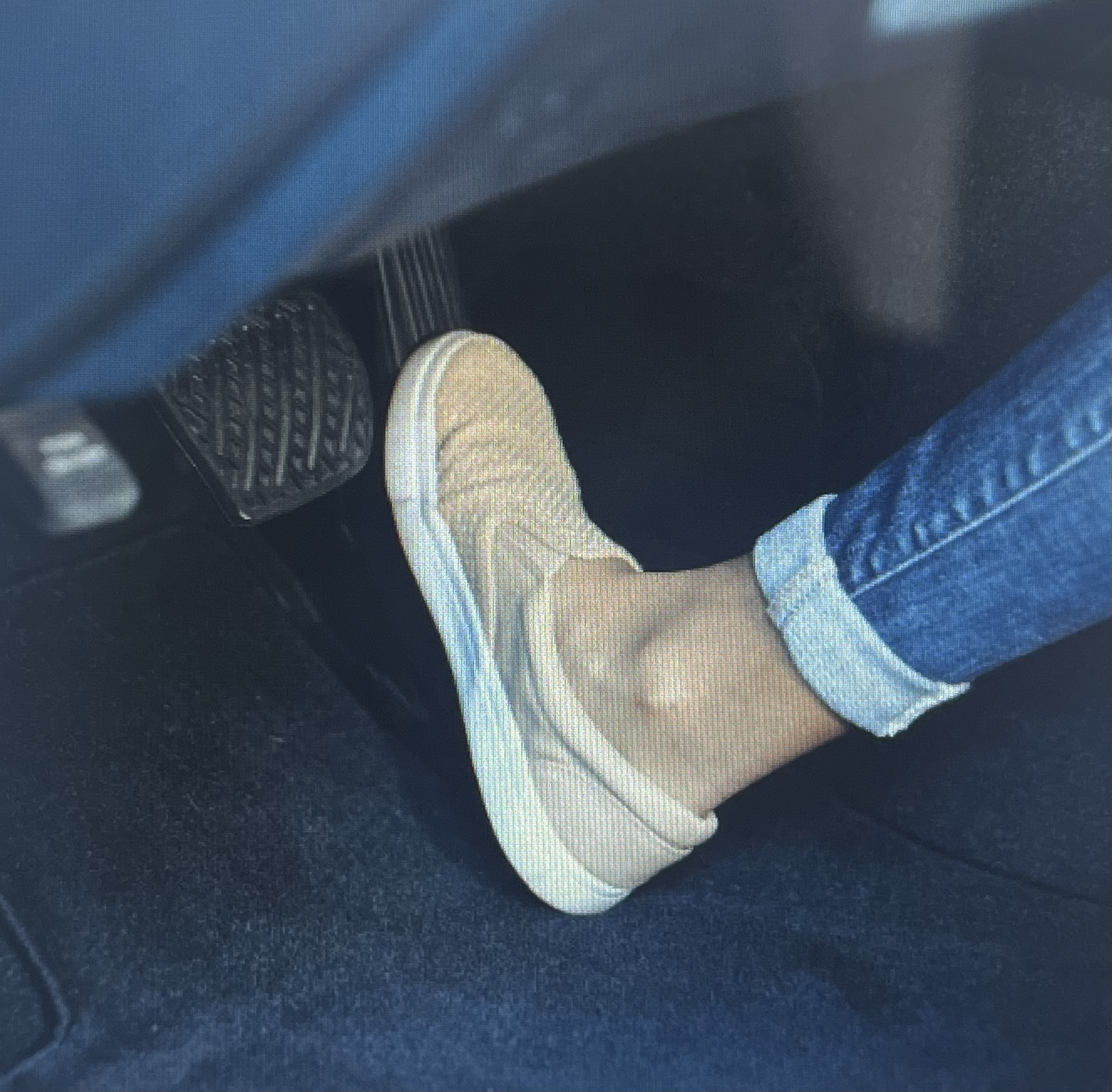
Brake Pedal location & purpose & extra facts (3)
Location: Left of accelerator pedal.
Purpose: slow vehicle dow
Fact: pressure to break pedal = how fast vehicle slows down
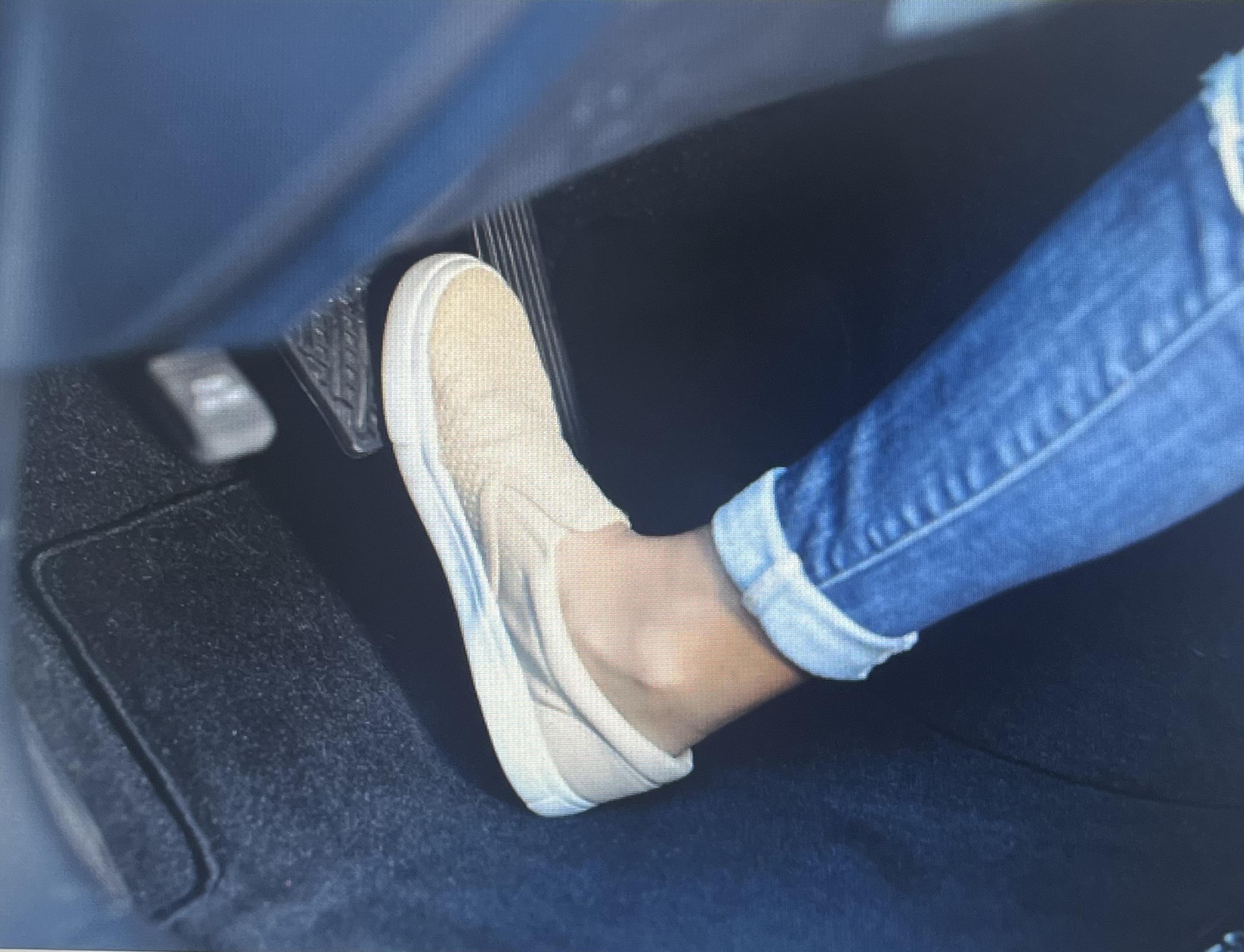
Clutch pedal location & purpose & extra fact (3)
Location: To left of brake pedal.
Purpose: Transmission’s drive gears are disengaged and the driver can shift gears manually
Fact: found in manual transmission vehicles.
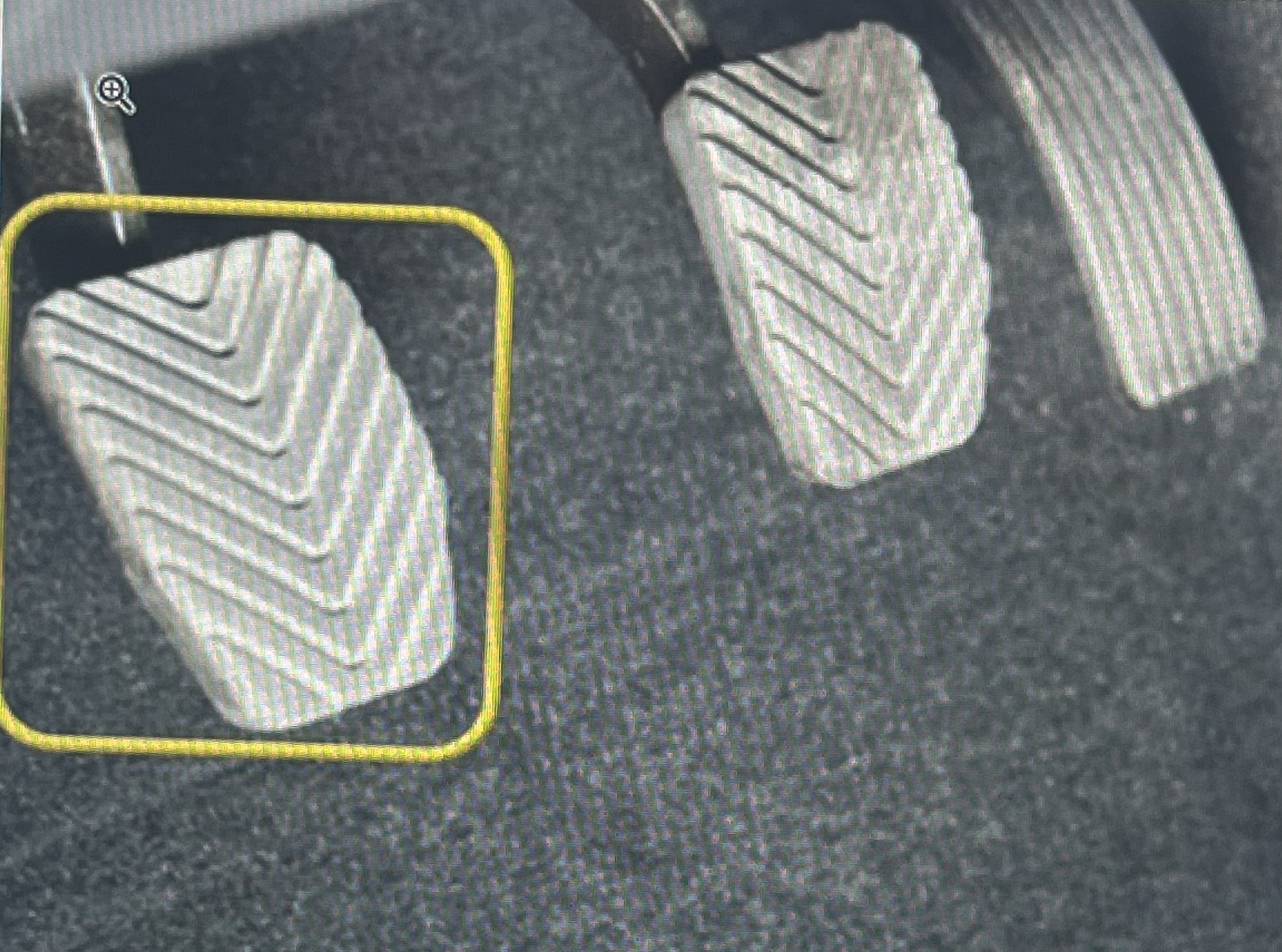
Dead Pedal location & purpose (2)
Location: Footrest found farthest left of car.
Purpose: Be resting place for driver’s left foot.
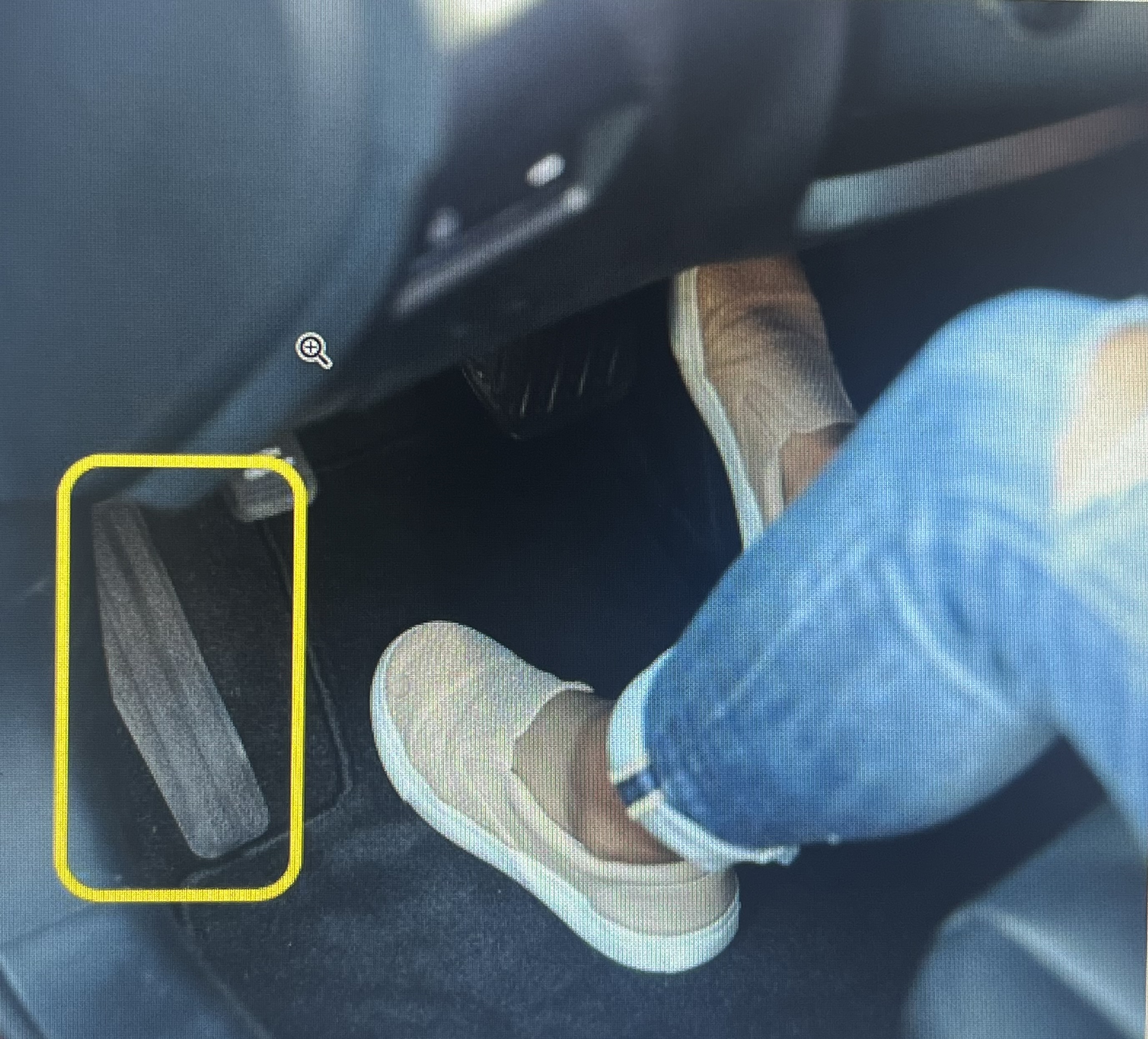
Where parking brakes might be found in a vehicle (5)
Foot-operated pedal to the far left of the driver's seat
Hand-operated lever to the far side of the driver's seat
To the right of the steering column
On the floor
In the center console
Cruise / speed control purpose, settings & how to cancel (3)
Maintain specific speed without keeping foot on accelerator
On/off, set/accelerate, coast/resume
Cancel cruise/ speed by either touching off/ cancel button or pressing the brake pedal.
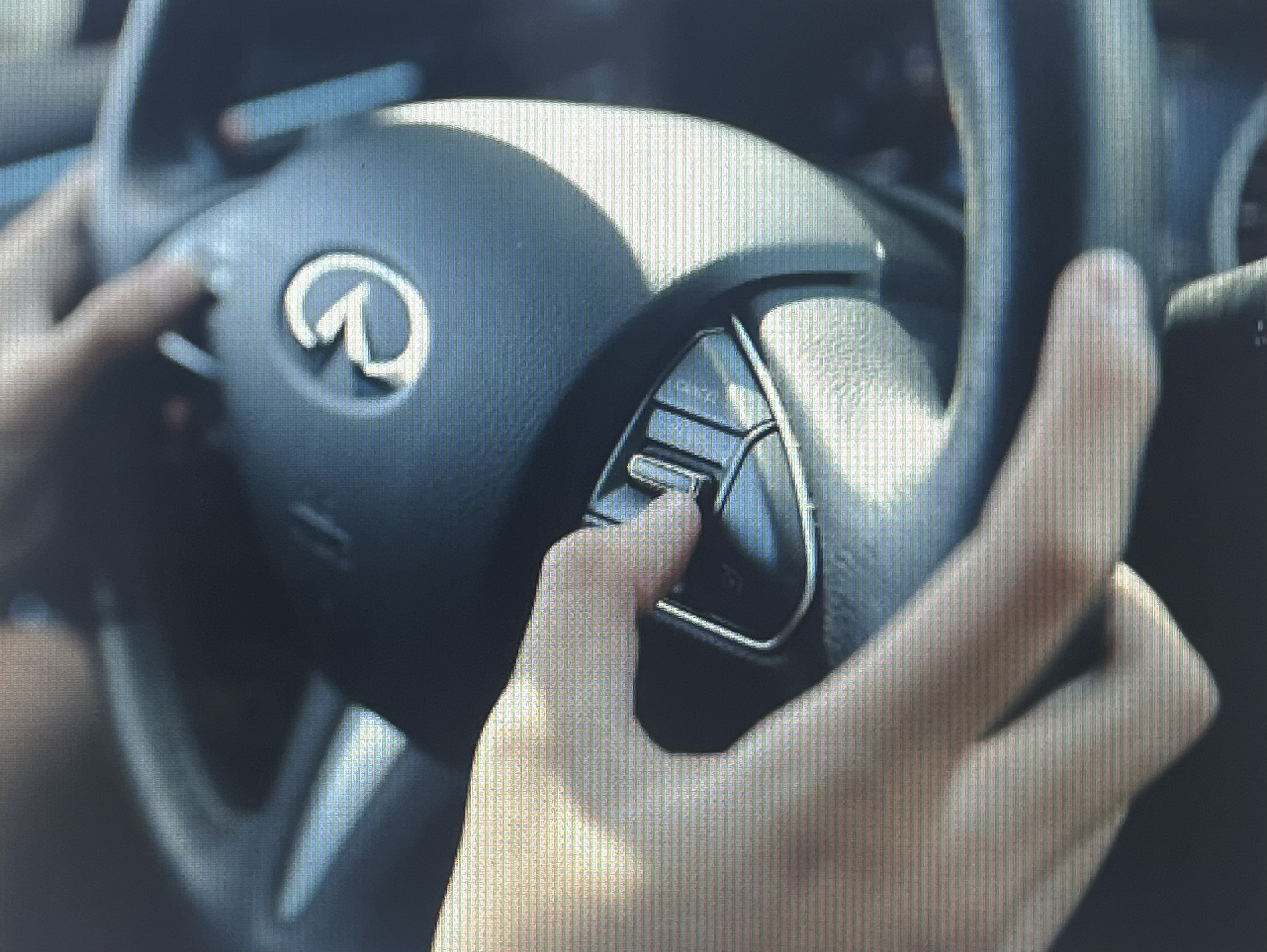
Drivers should NOT use cruise control in
heavy traffic, rain, ice, snow, or when there are slick-surface and reduced traction conditions.
Turn-signal lever location, function, how to use (3)
Location: left side of steering column
Function: indicate a turn.
Can be operated only with fingertips
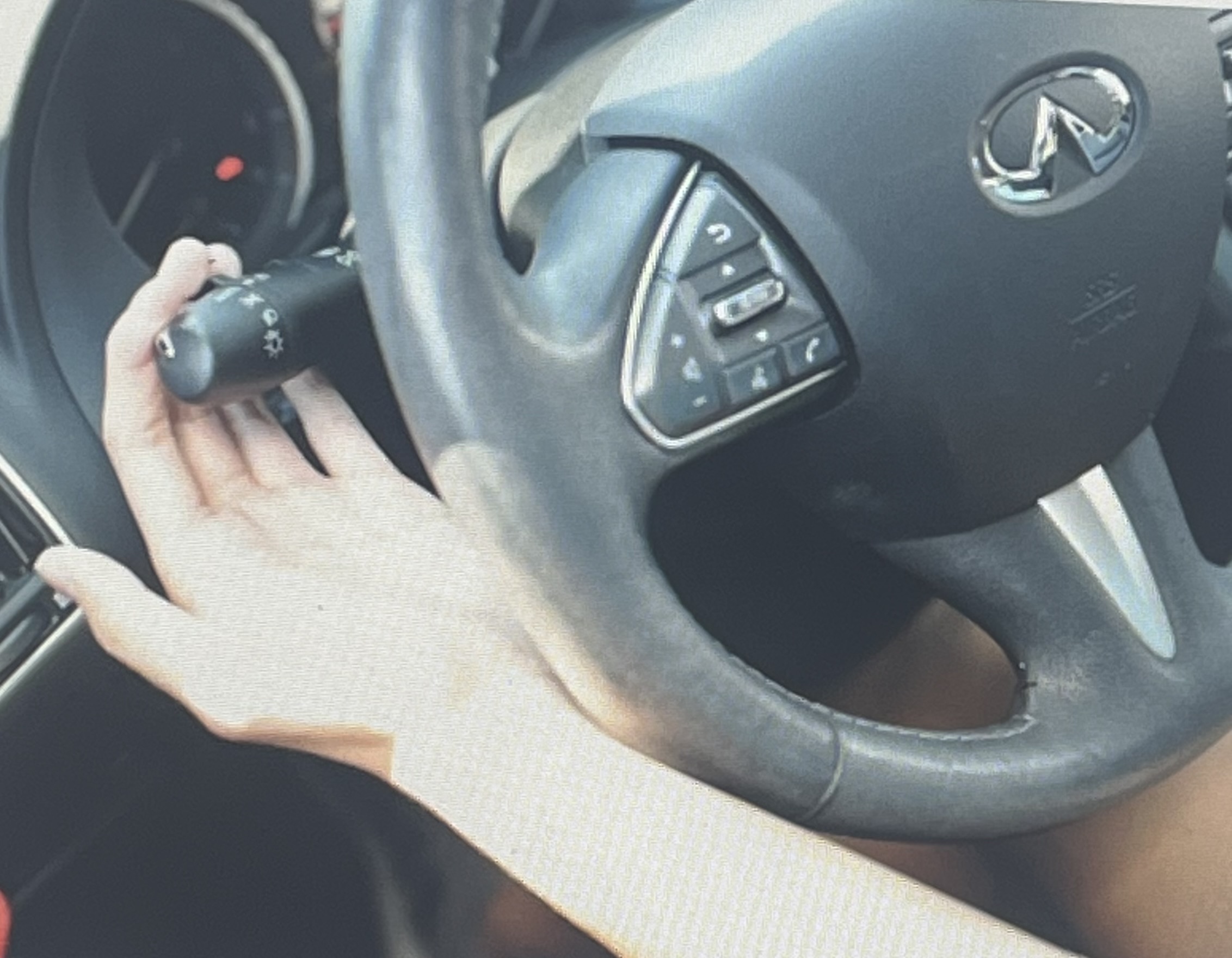
How to use turn-signal to signal turning left or right (2)
UP for Right turns
DOWN for Left turns
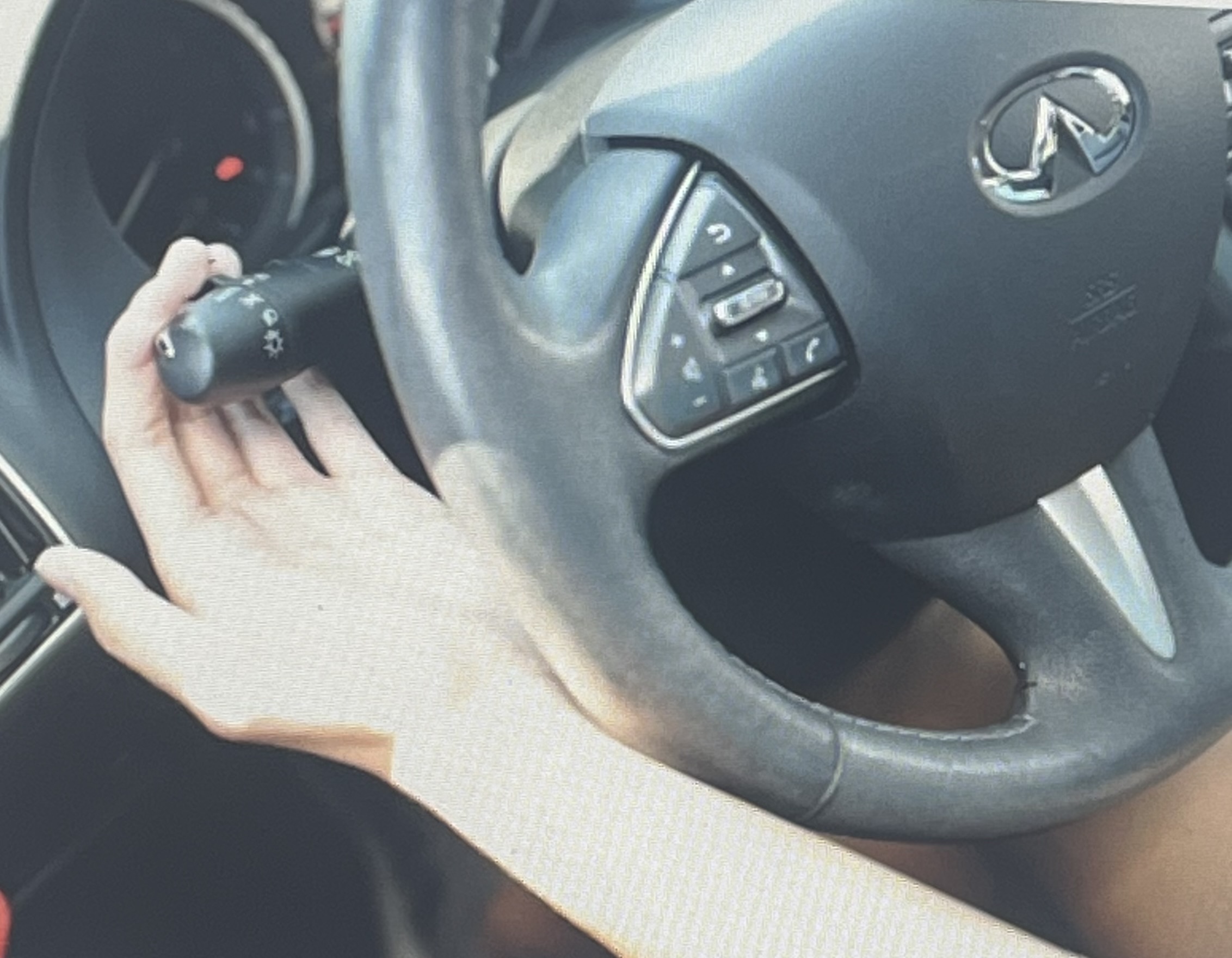
You should typically turn on turning-signal at least ______ before turning or changing lanes
100 feet
Turn signals do ___________ turn off
NOT ALWAYS AUTOMATICALLY
Hazard Flashers purpose & locations (2)
Purpose: Alert other drivers of problem or vehicle presence
Locations: top or right side of steering column, or near center of dashboard. May be located elsewhere.
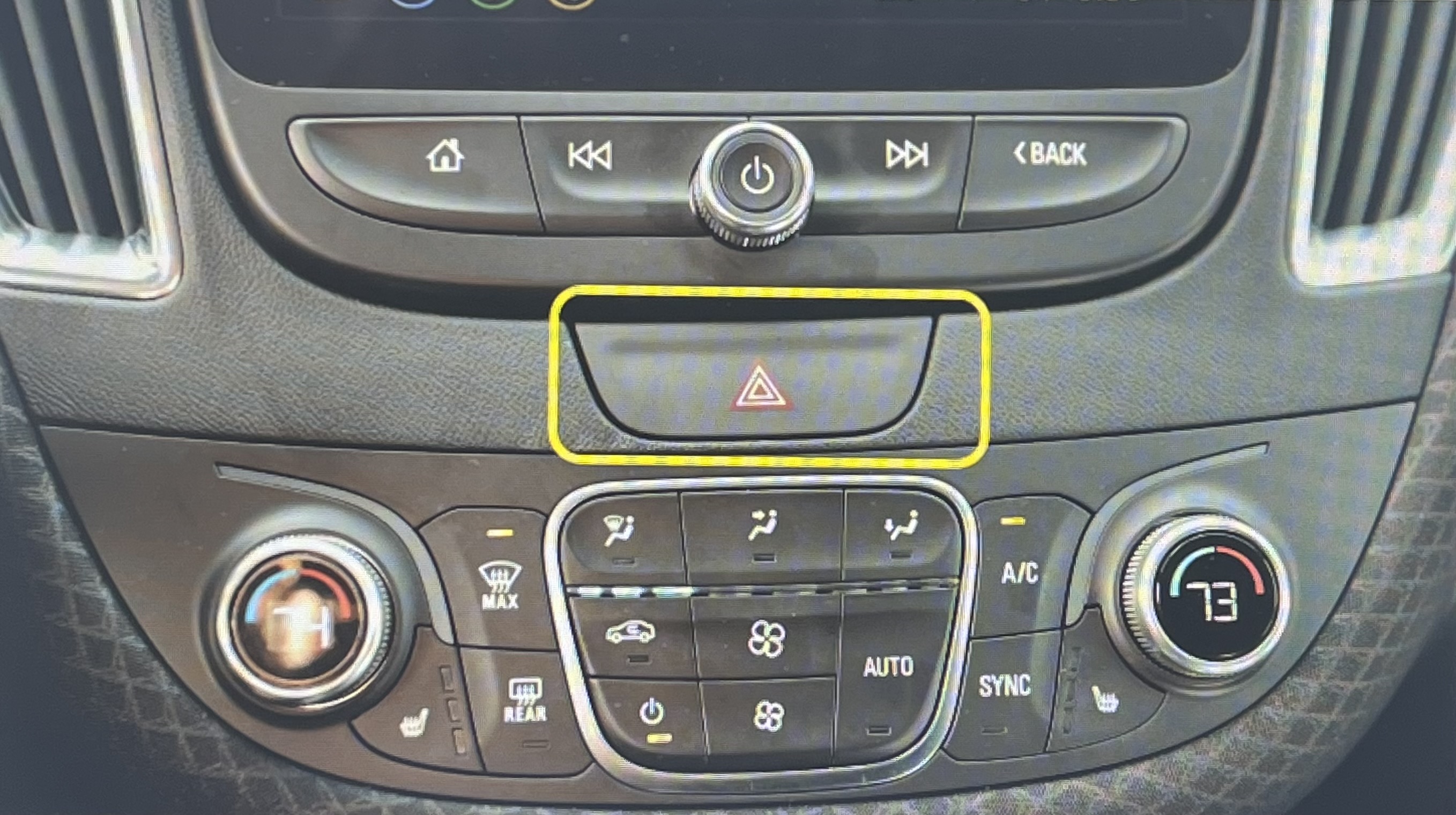
Windshield Wiper Control Switch locations, function (2)
On dashboard/on turn-signal lever/ separate lever on right side of steering column
Function: wiper blade & washer fluid spray control included here.
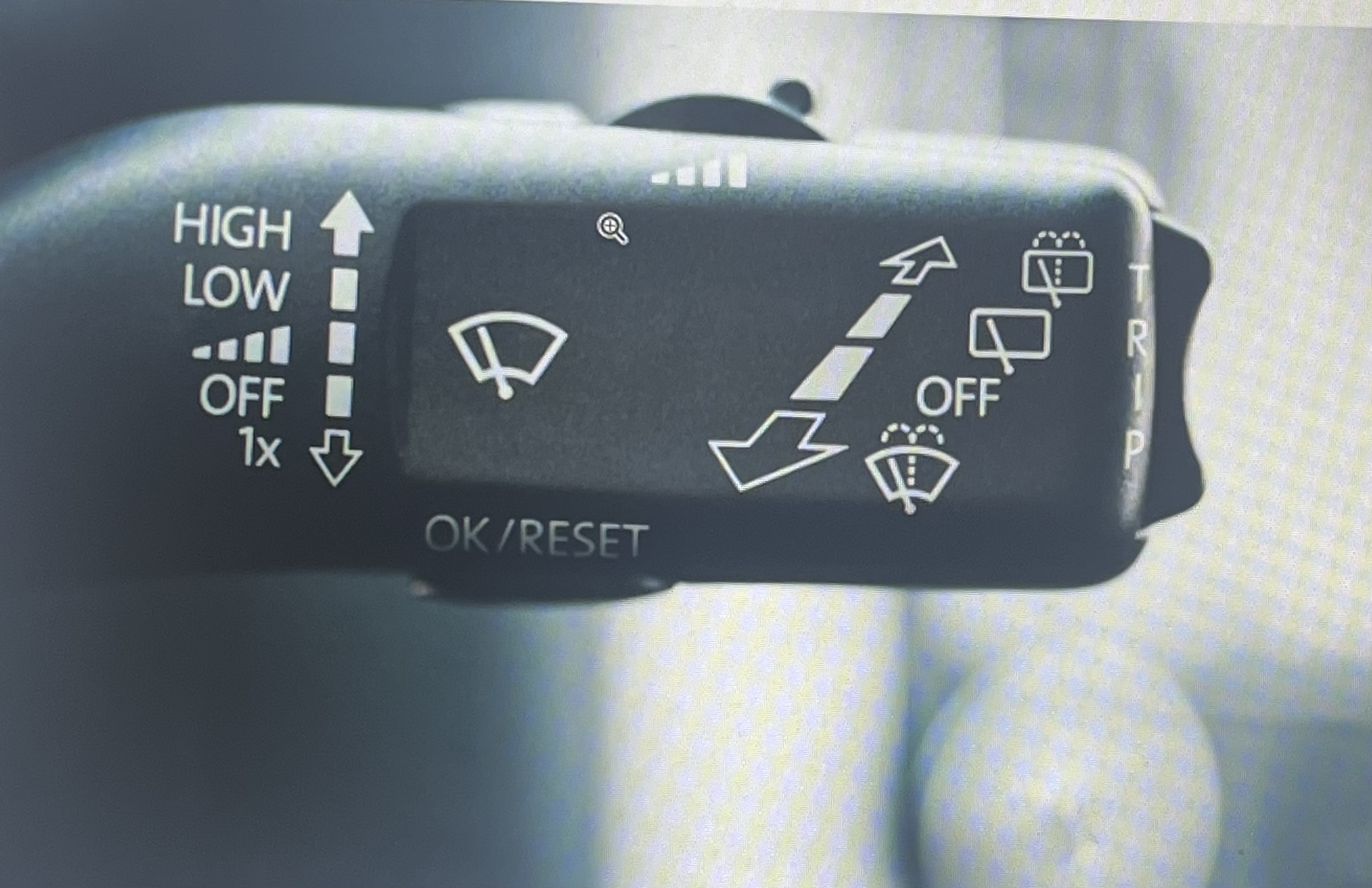
Headlight Switch controls power to (5)
Parking lights
Taillights
Side-marker lights
License-plate light
Instrument panel lighting
Headlight switch location & when to use
Location: left side of instrument panel, on same lever as turn signal, or a separate lever.
Use headlights every time you drive—day or night
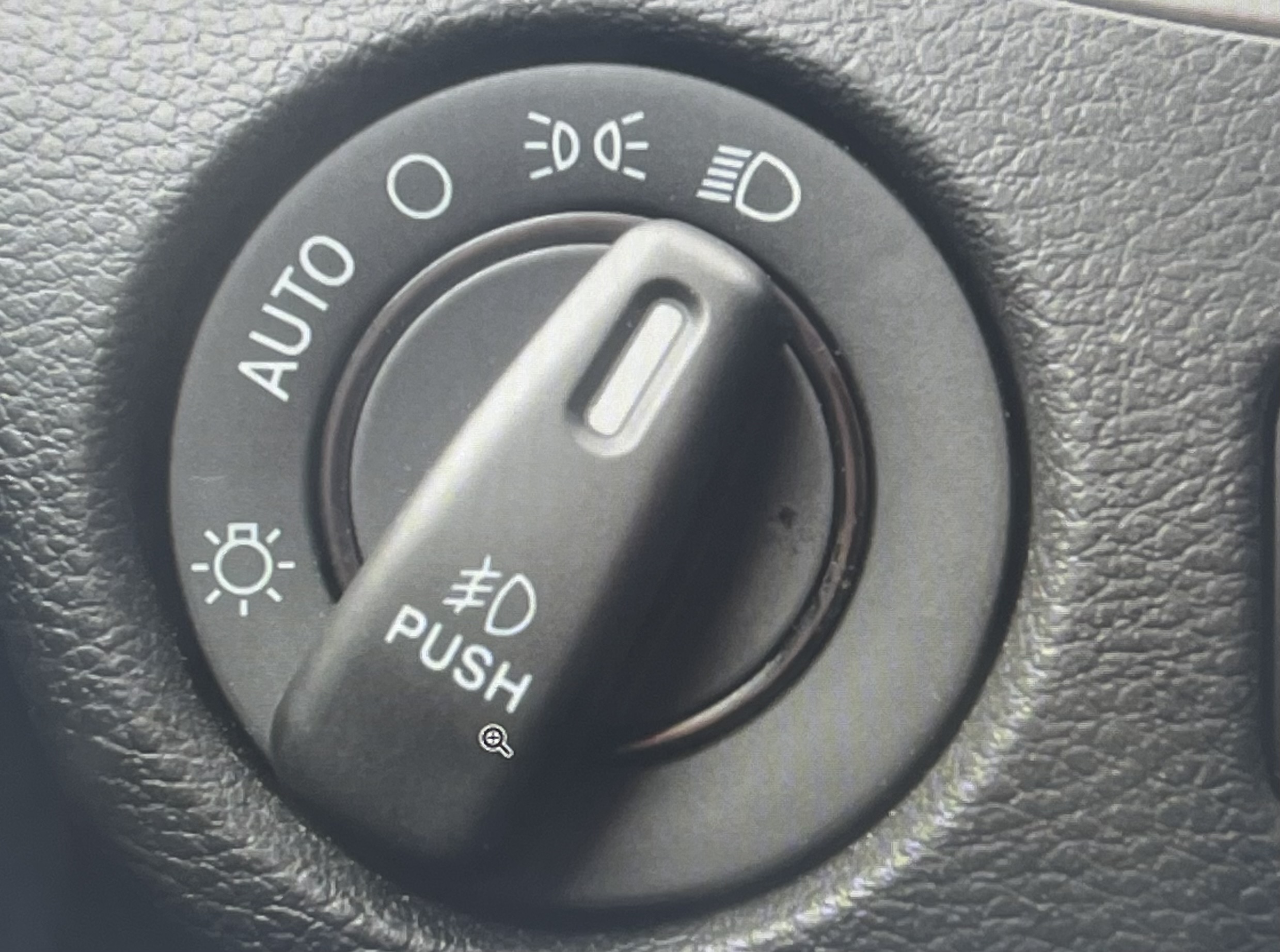
High-Beam Switch location, how to use (2)
Location: left side of steering column
Switch between high-beam and low-beam headlights by moving forward for high and rearward for low
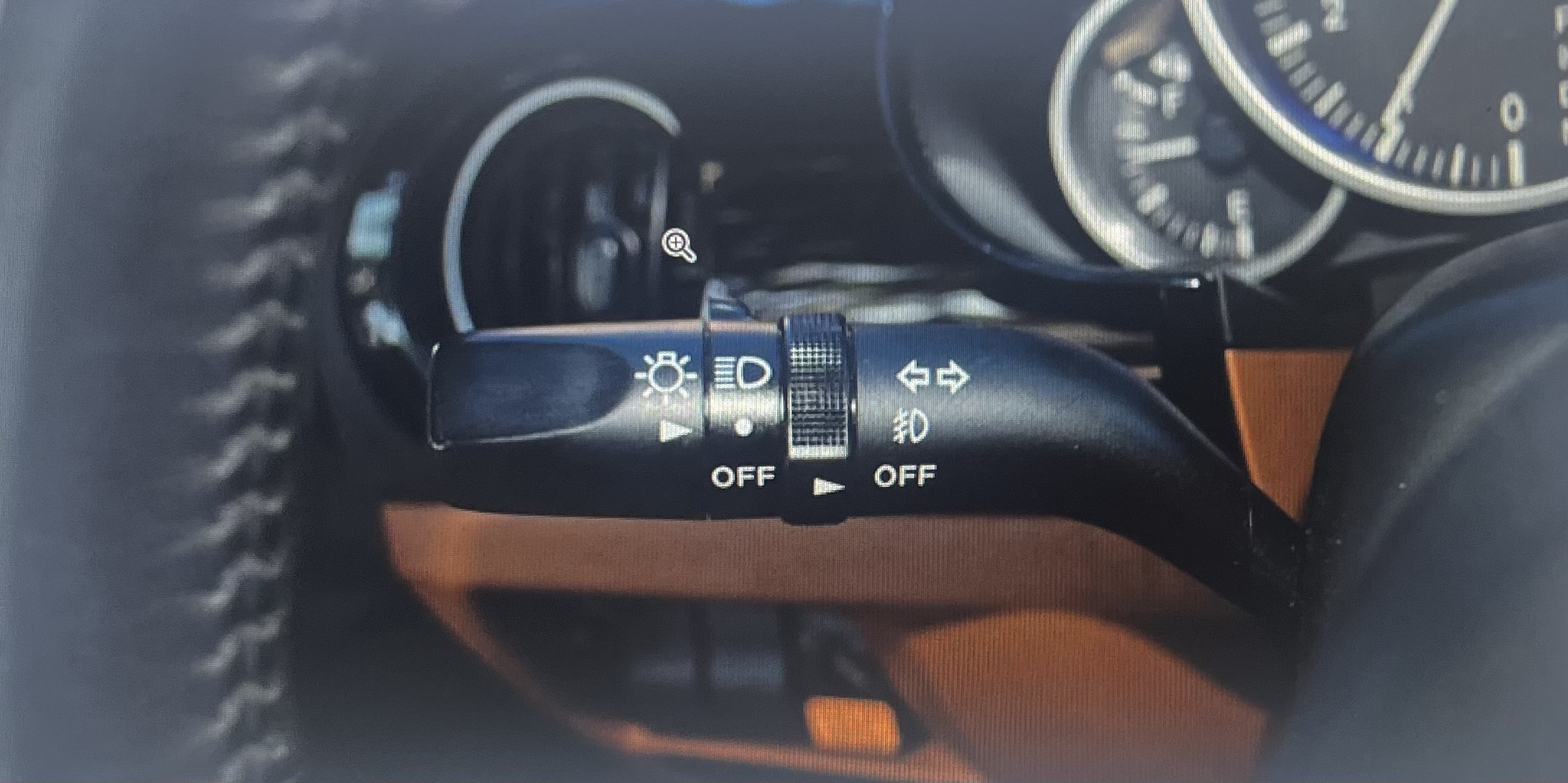
Controls for the heater, defroster and air conditioner typically located
In a cluster on the instrument panel
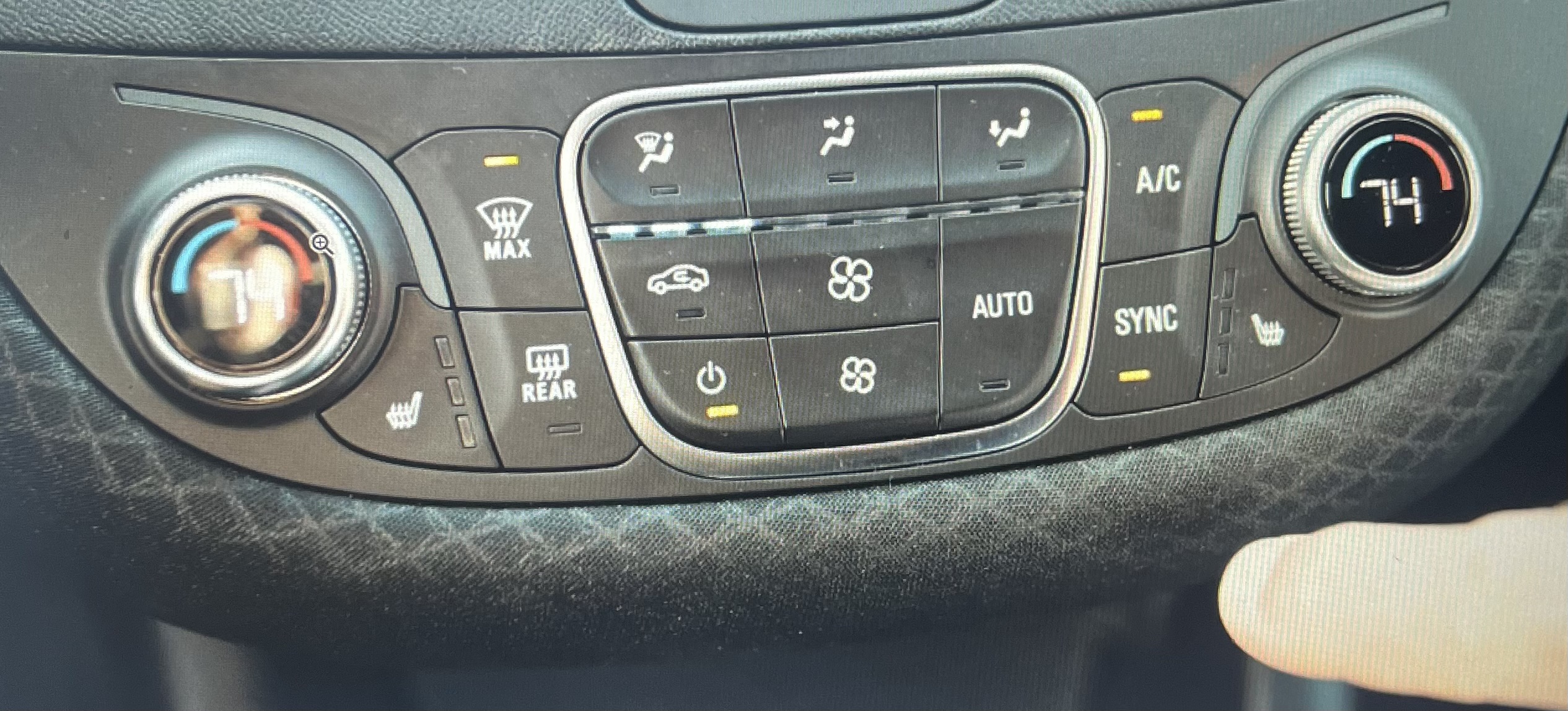
The rink or hatch release lever is generally positioned in one of these locations (5)
On the floor just to the left of the driver's seat (occasionally on the right side)
Driver's door panel
In center console
To the left of the steering wheel
Button found in the glove box
Fuel door ways to be opened (2)
Fuel-door security system
By pulling on the door
Fuel door release button/ lever can typically be found in or around (4)
Floor to the left of the driver
Center console
Glove box
Driver's door panel
Speedometer (3)
Shows how fast you are going
Measure = "miles per hour" (mph)
Showing a speed of 80 mph
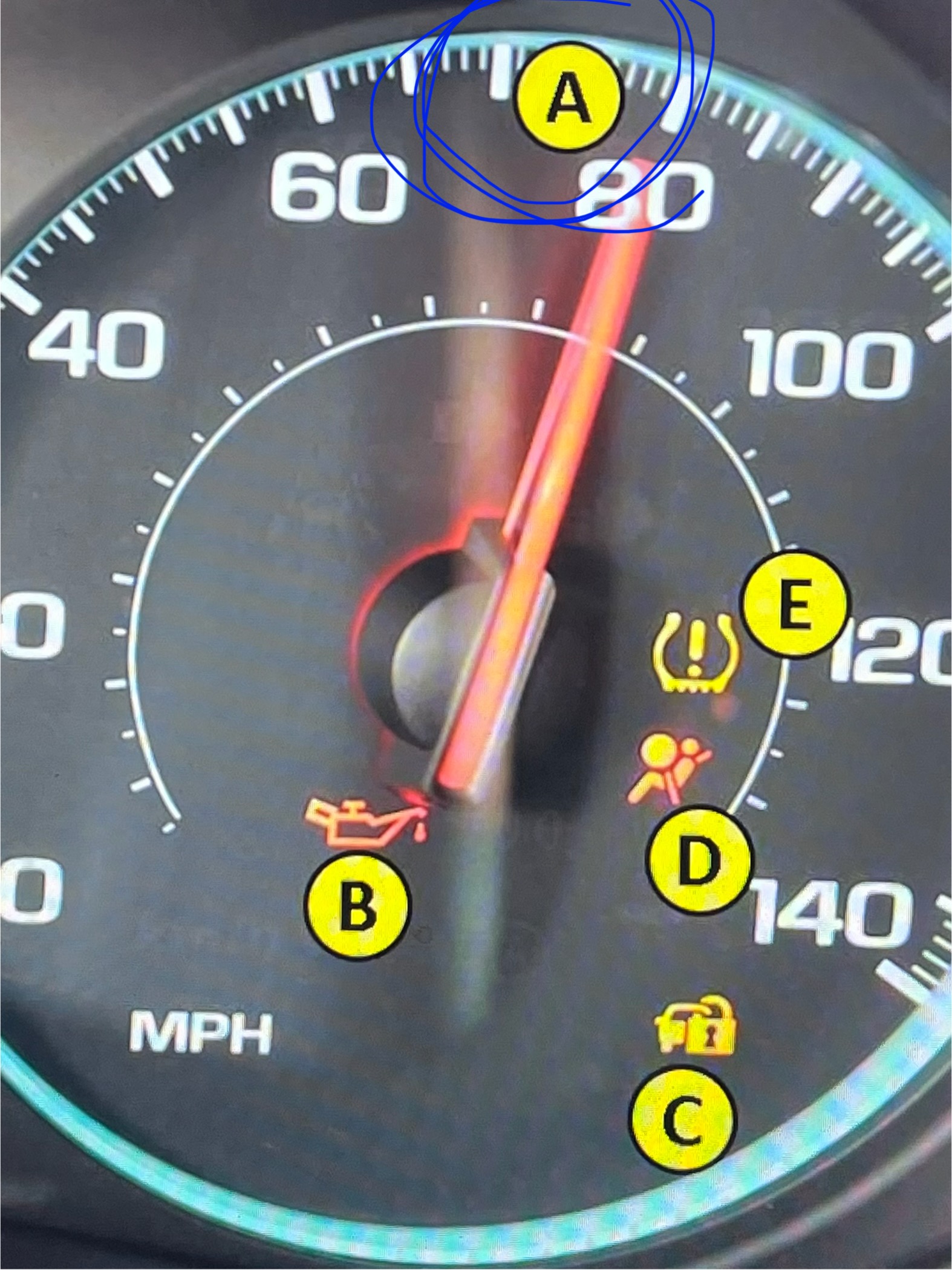
Oil warning light (2)
Engine might be low on oil, or it may be too hot
You should stop; do not drive the vehicle any farther
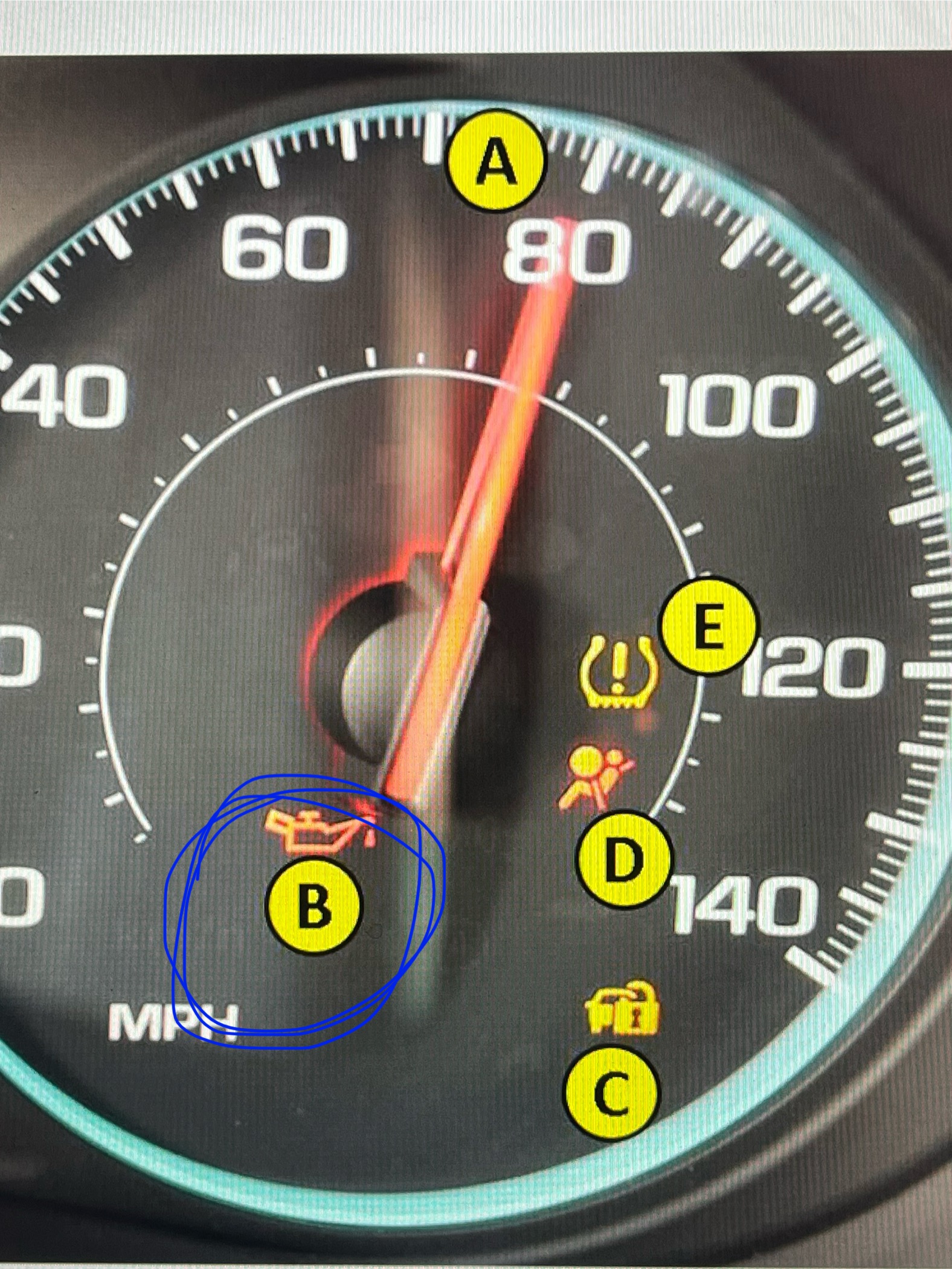
Anti theft system
Vehicle security is active
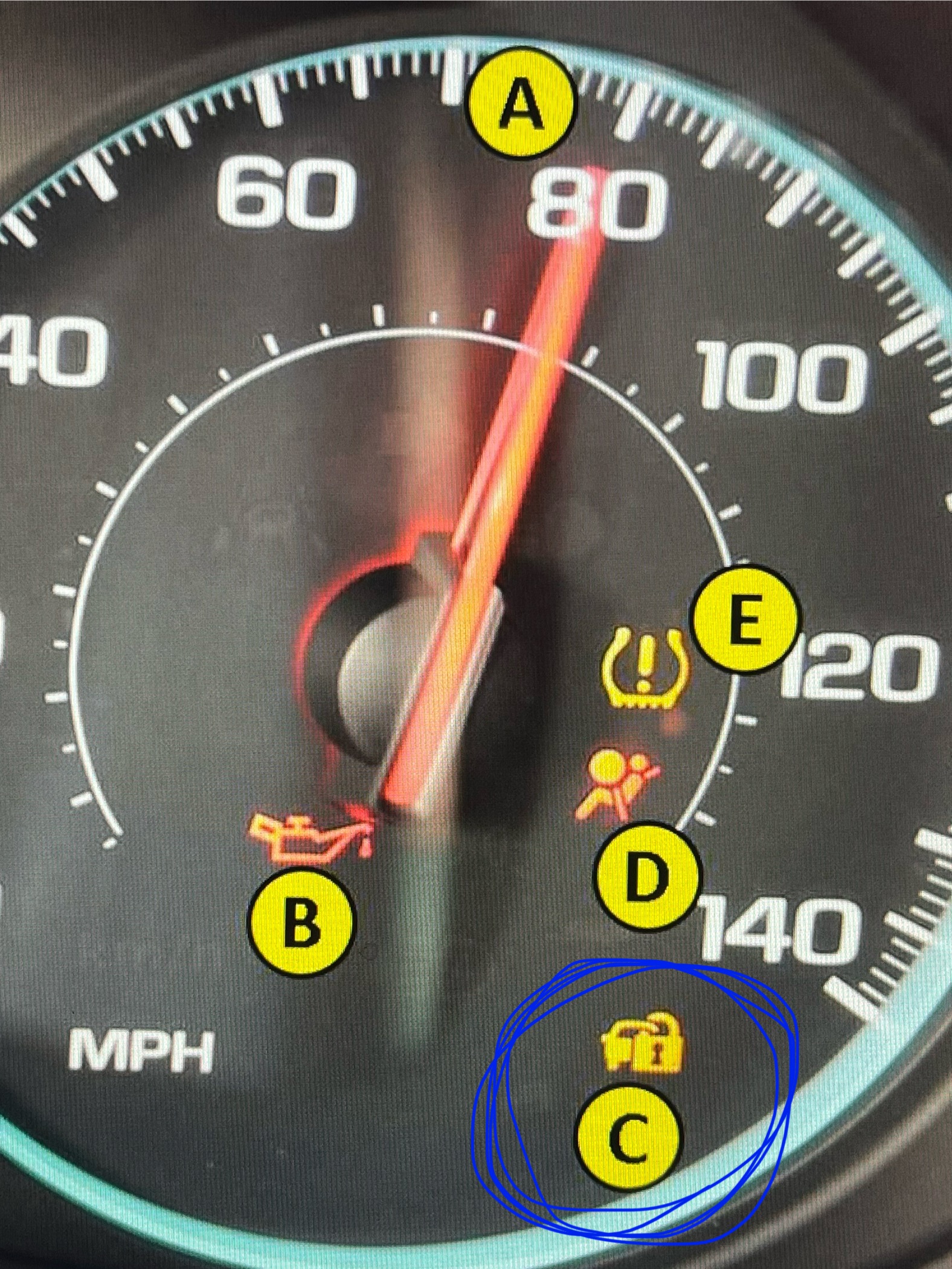
Airbag light
If it remains on, there is a problem with the airbag that must be corrected.
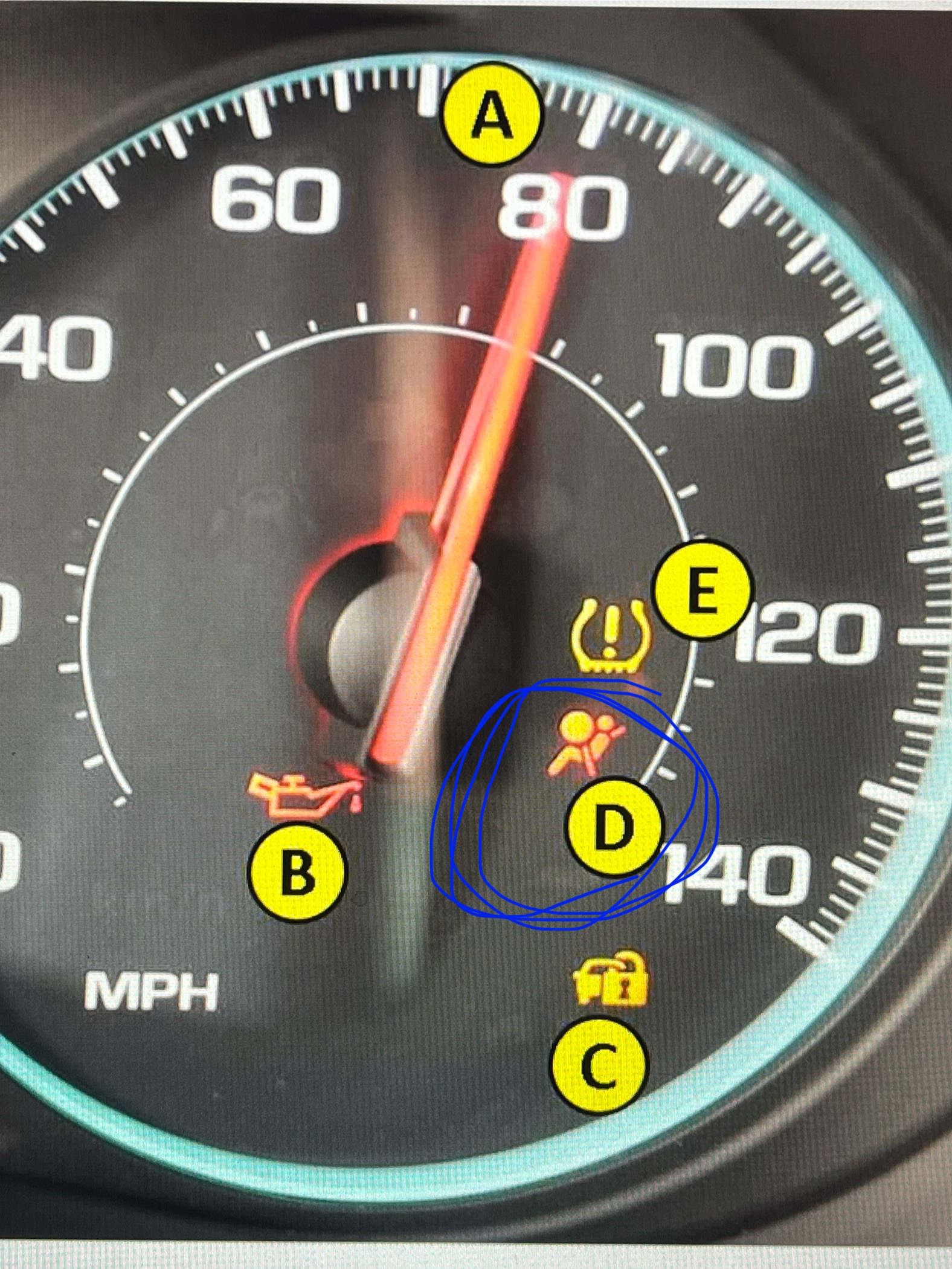
Tire Pressure Monitoring System (TPMS) Light
Warns the driver if one or more tires are underinflated
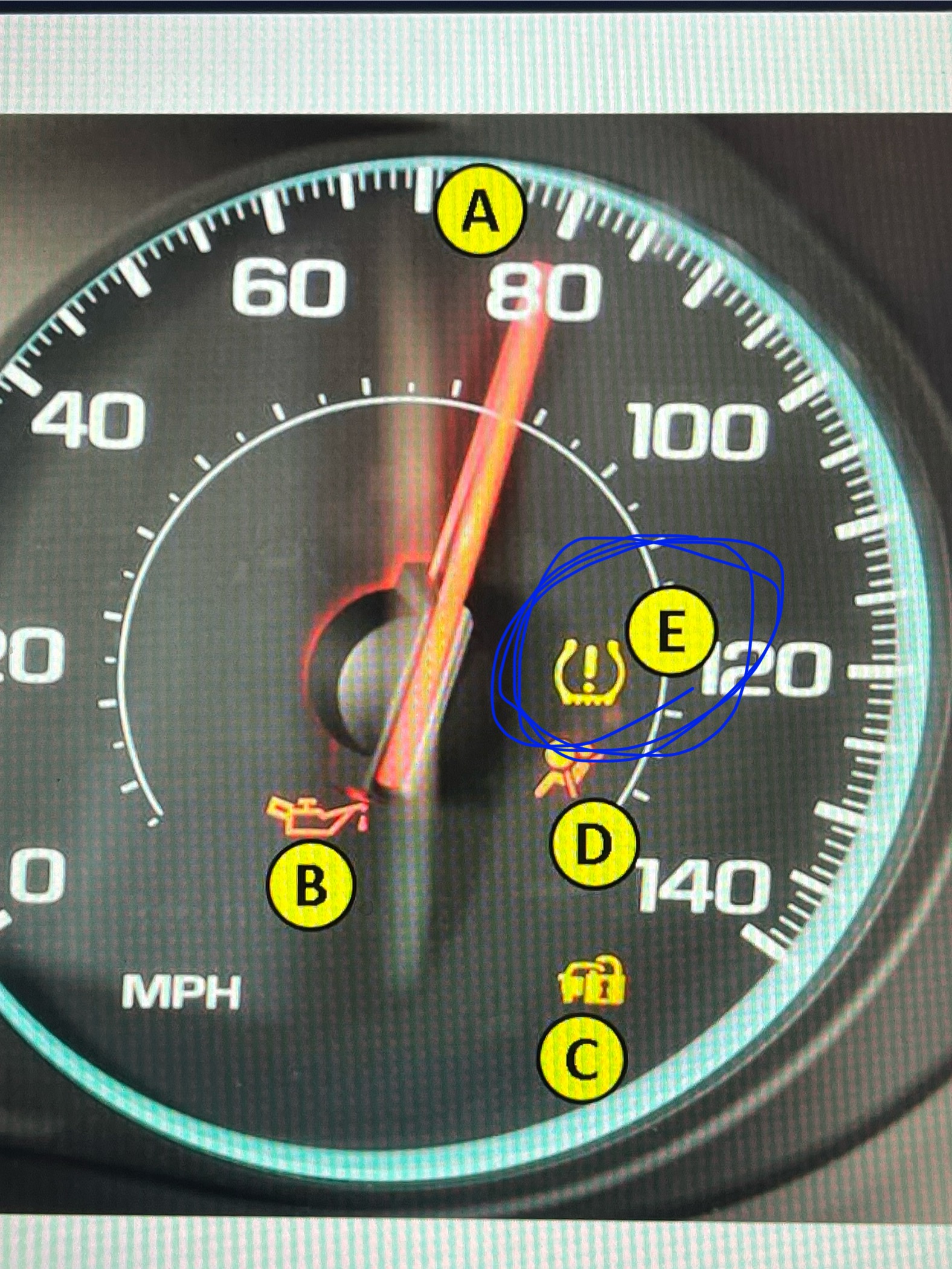
Tachometer
Shows how hard engine is working
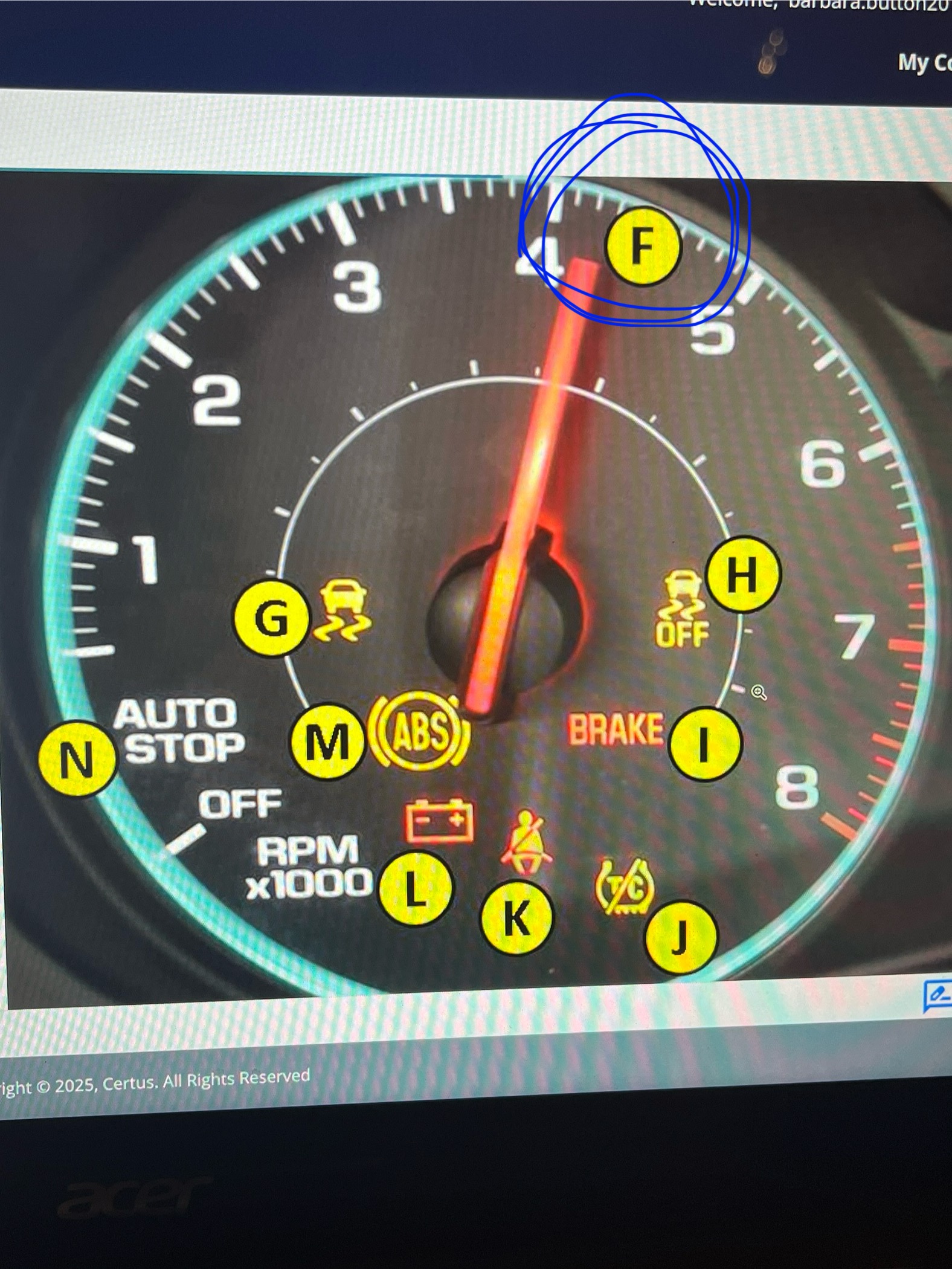
Electronic Stability Control “On” light (4)
Commonly referred to as "ESC"
ESC helps maintain traction when the driver enters a turn at too high a speed
It aims to prevent front-tire and rear-tire skids
In some vehicles, this light comes on when the system activates
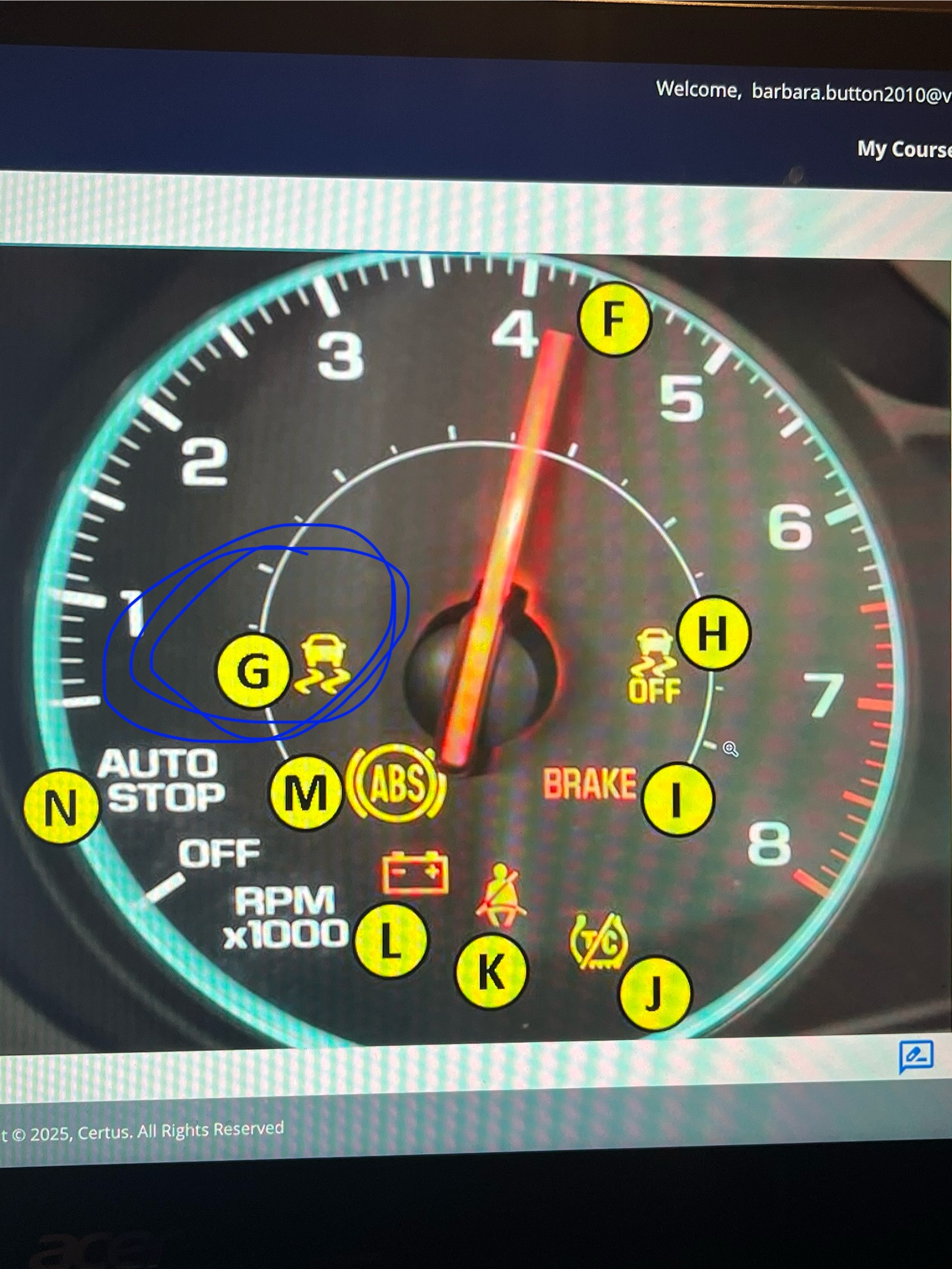
Electronic Stability Control “Off” light (2)
This is displayed when ESC is not working
In some vehicles, the driver can deactivate ESC system
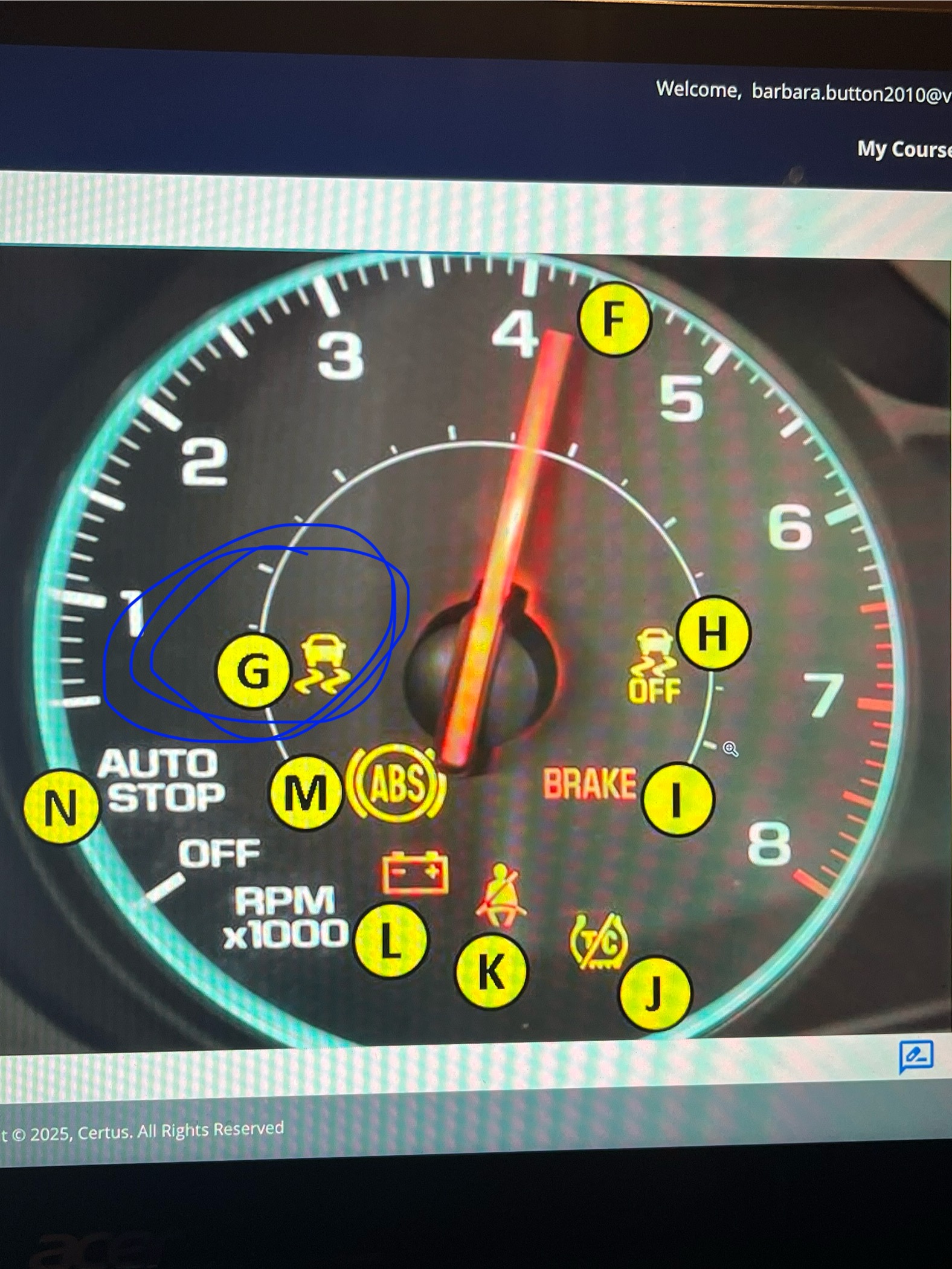
Parking brake “on” light
Means parking brake = activated
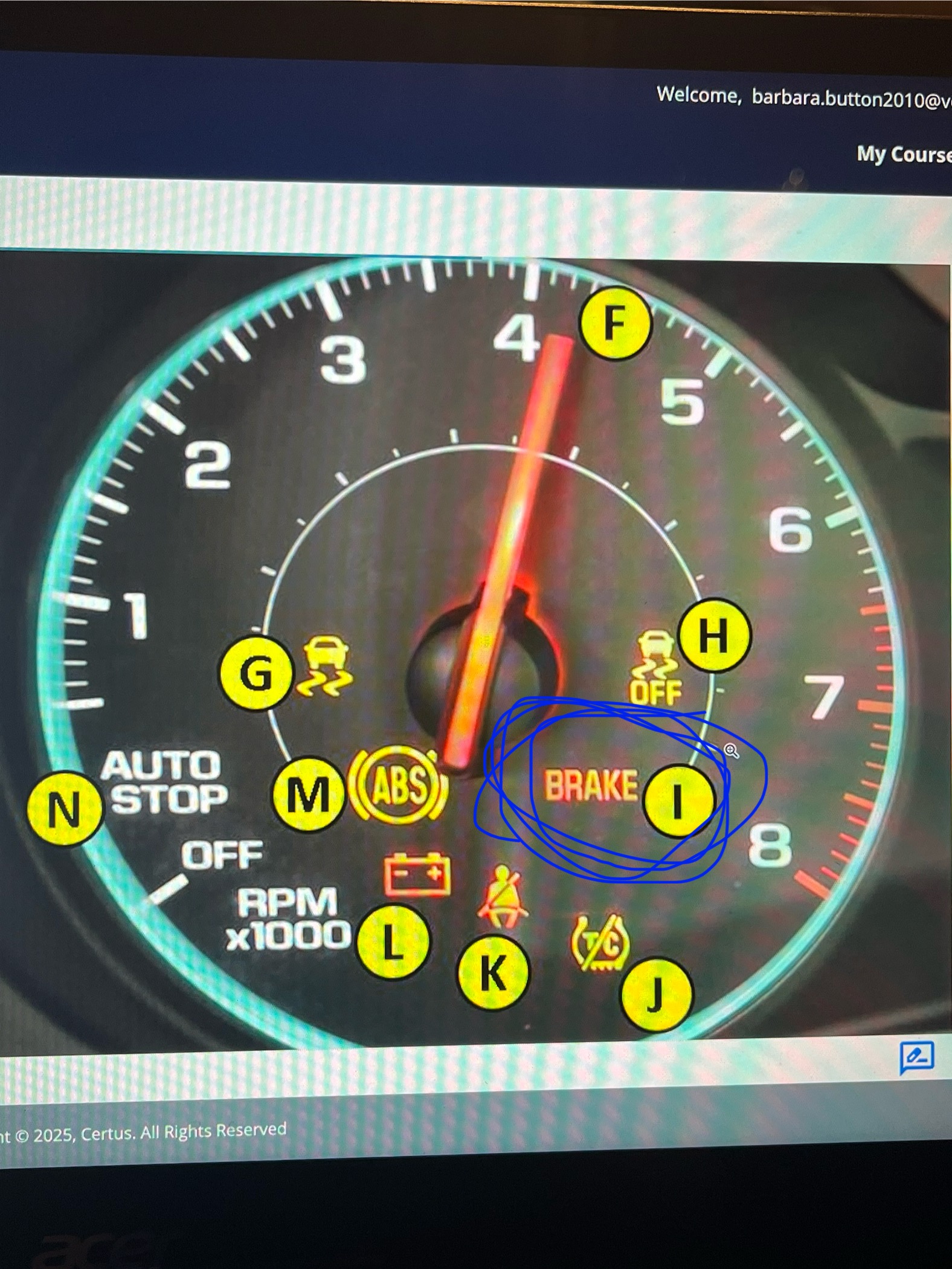
Traction Control “off” light (3)
Traction Control (TC) helps prevent wheelspin when the driver accelerates too hard
It is designed to prevent the drive wheels from spinning
Like with ESC, some vehicles allow the driver to deactivate the Traction Control system
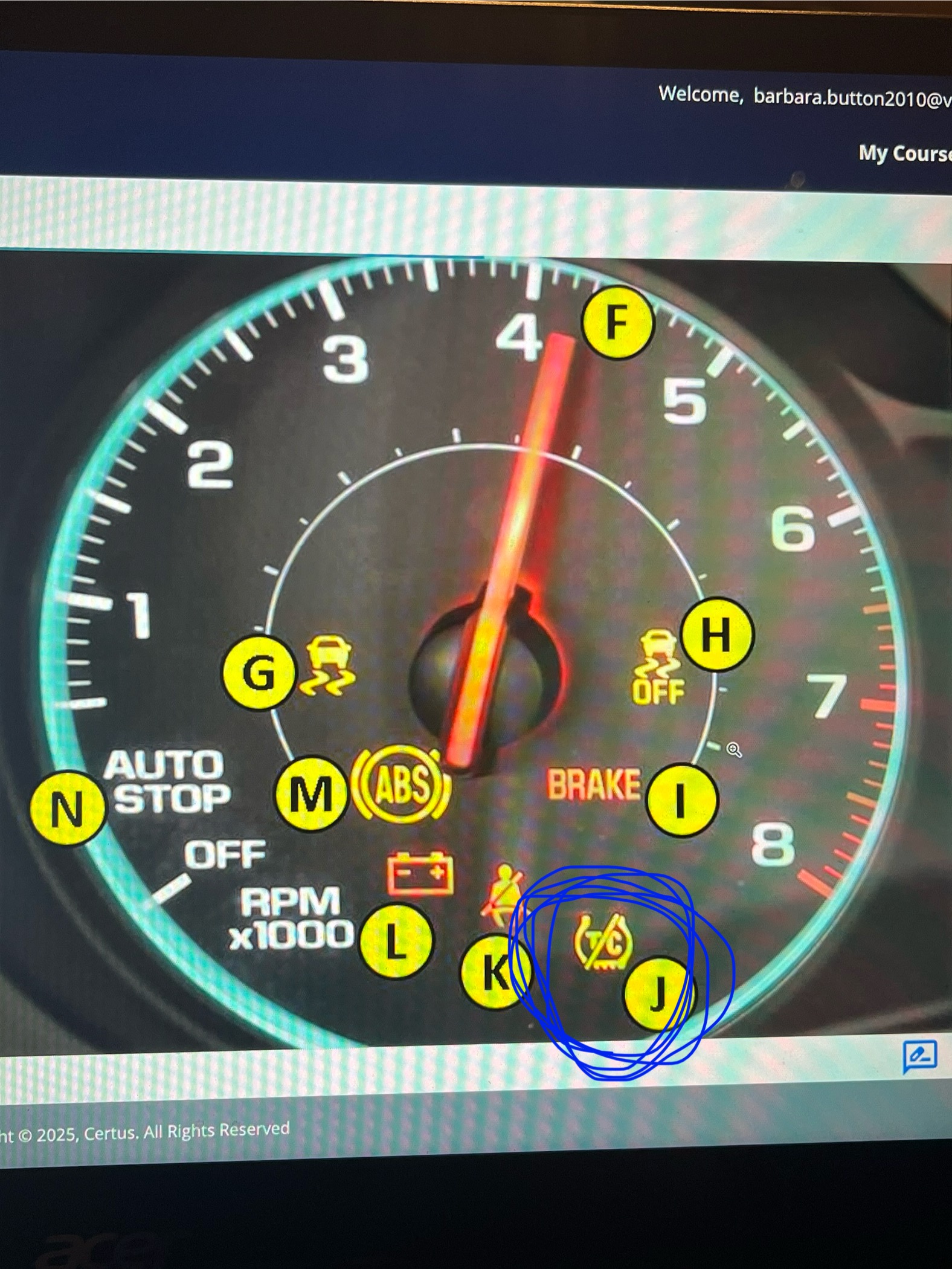
Safety belt reminder light (2)
Illuminates when vehicle detects one or more occupant has NOT buckled I
In many vehicles, chime is heard when light is on
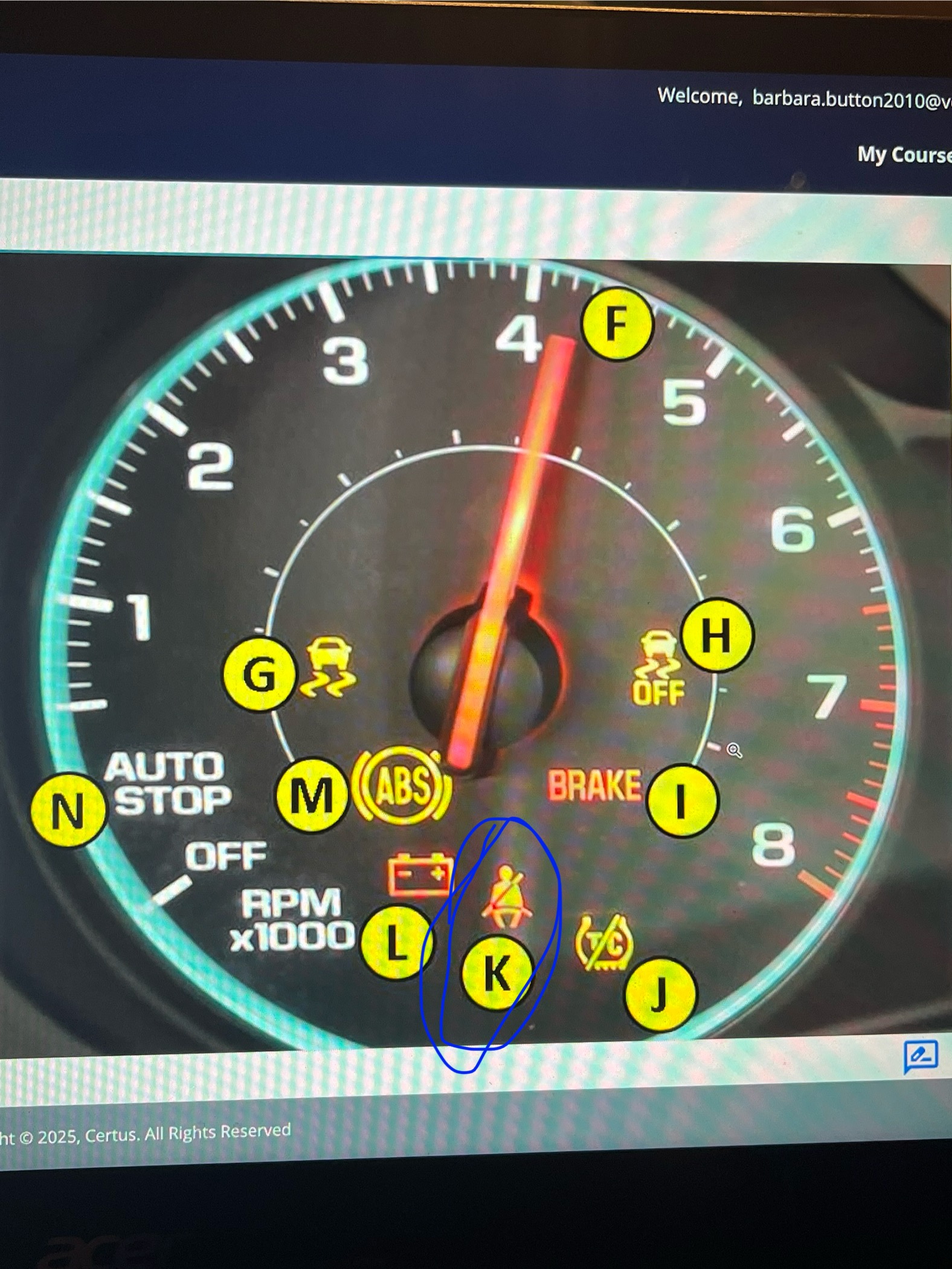
Battery light
Comes on if there is a problem with the battery or charging system
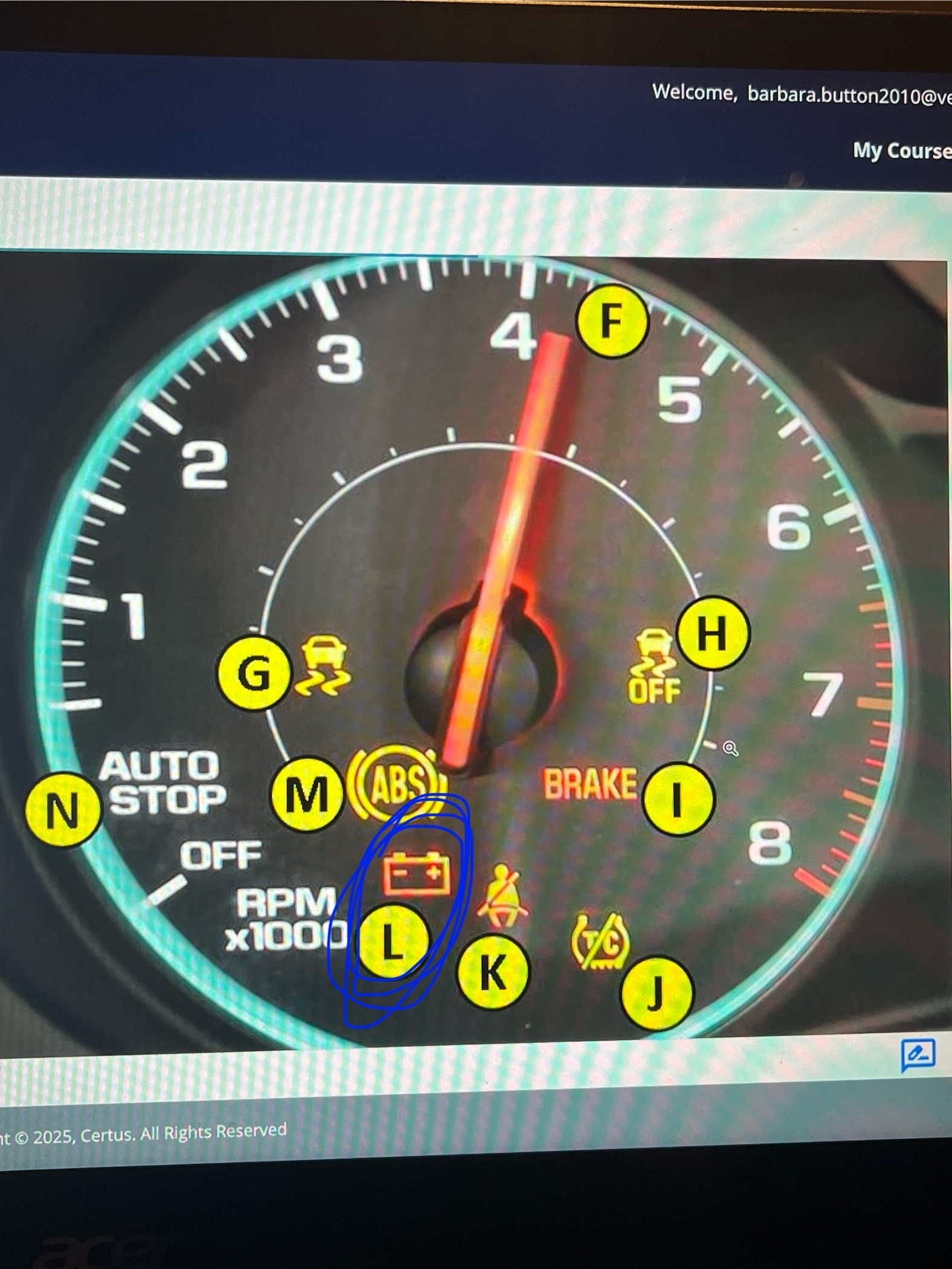
Anti-Lock Braking System (ABS) (2)
ABS helps prevent a vehicle's wheels from turning when the driver brakes very aggressively
This light comes on when there is a problem with the ABS
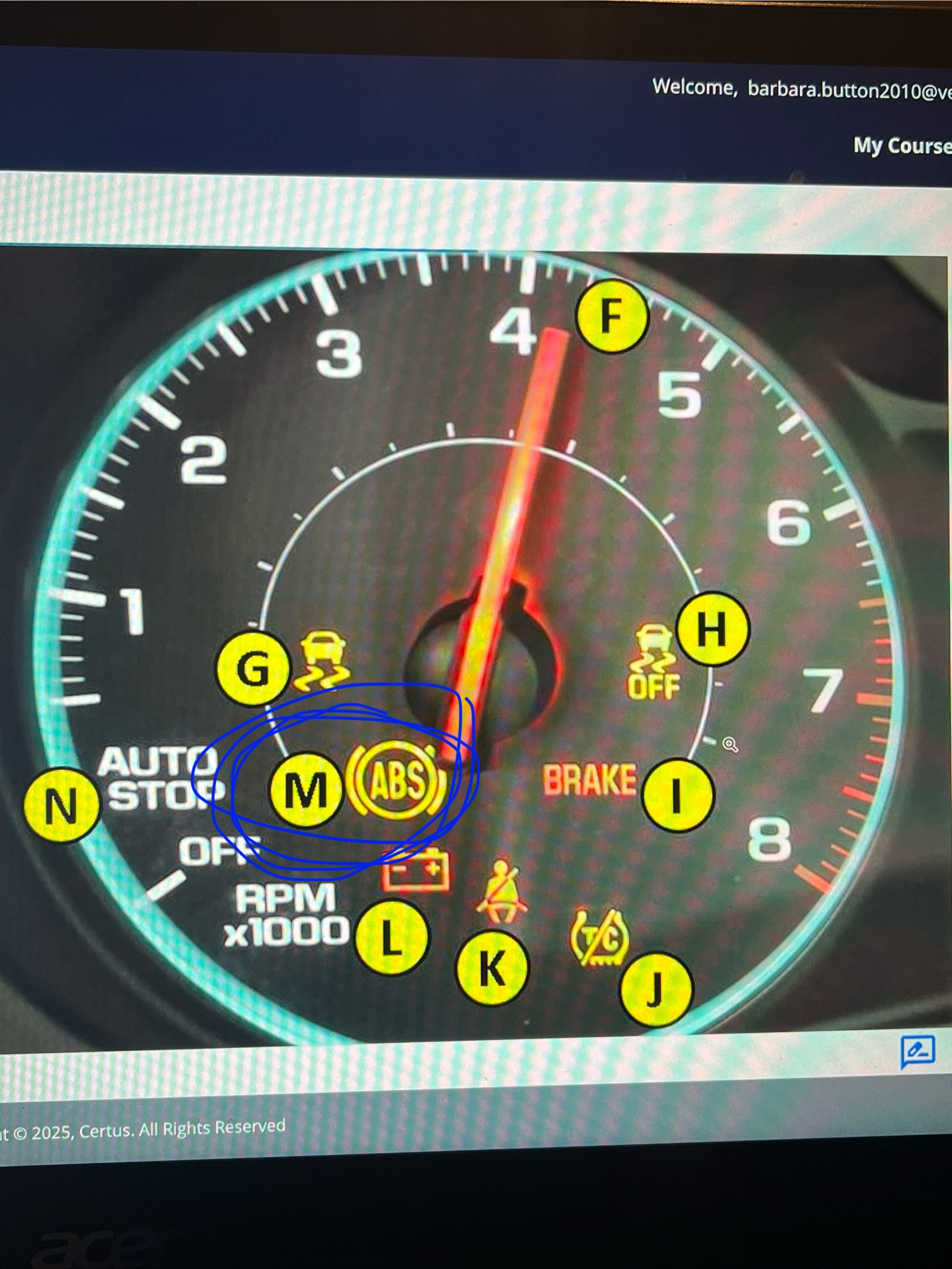
Auto Stop Light (3)
This lets the driver know that the Auto Stop system is activated
To save fuel, Auto Stop shuts the engine off when the vehicle is stopped, such as at a signal light
The engine restarts when the driver accelerates from a stopped position
What is O
Water temp gauge
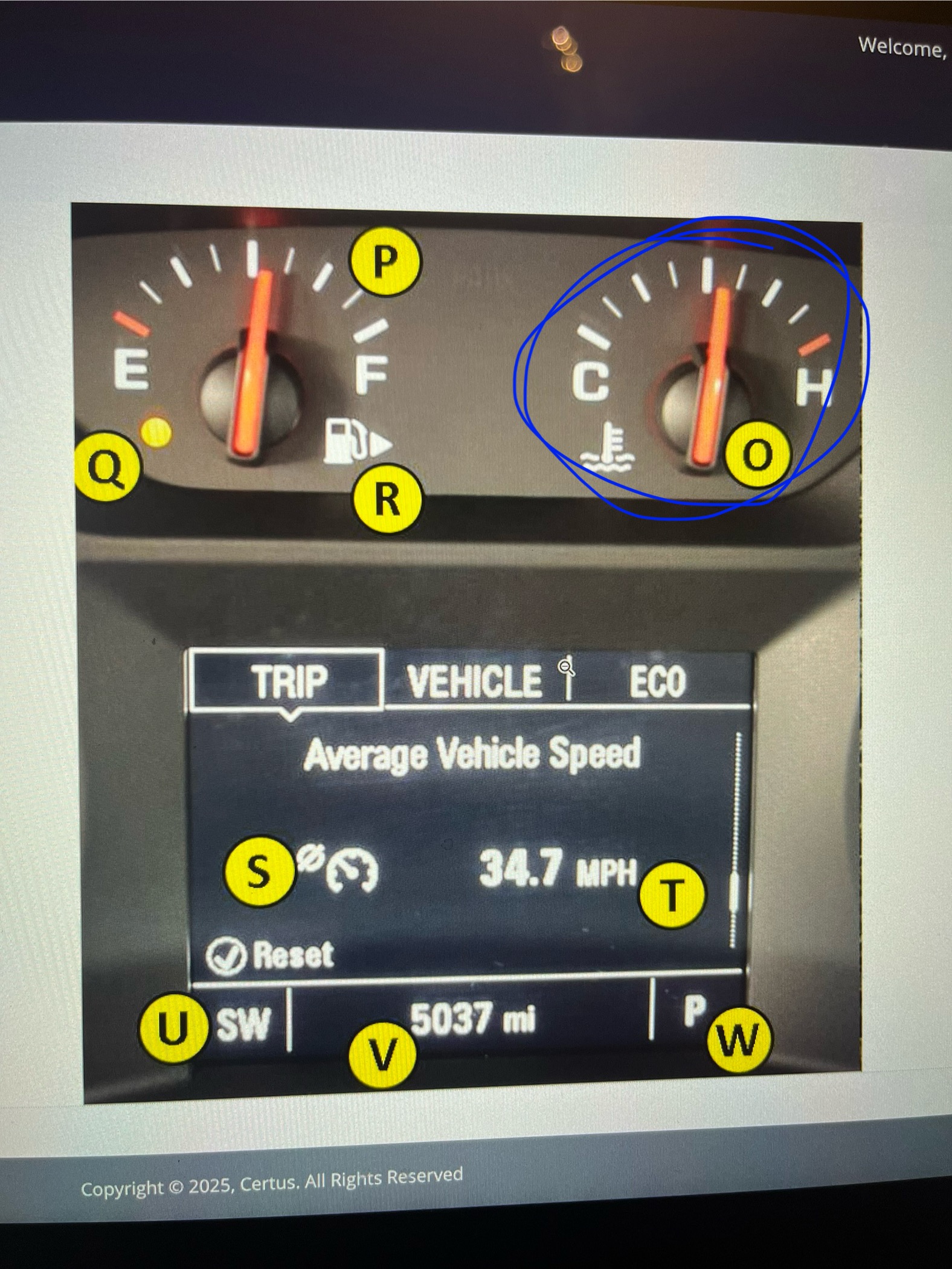
What is P
Fuel gauge
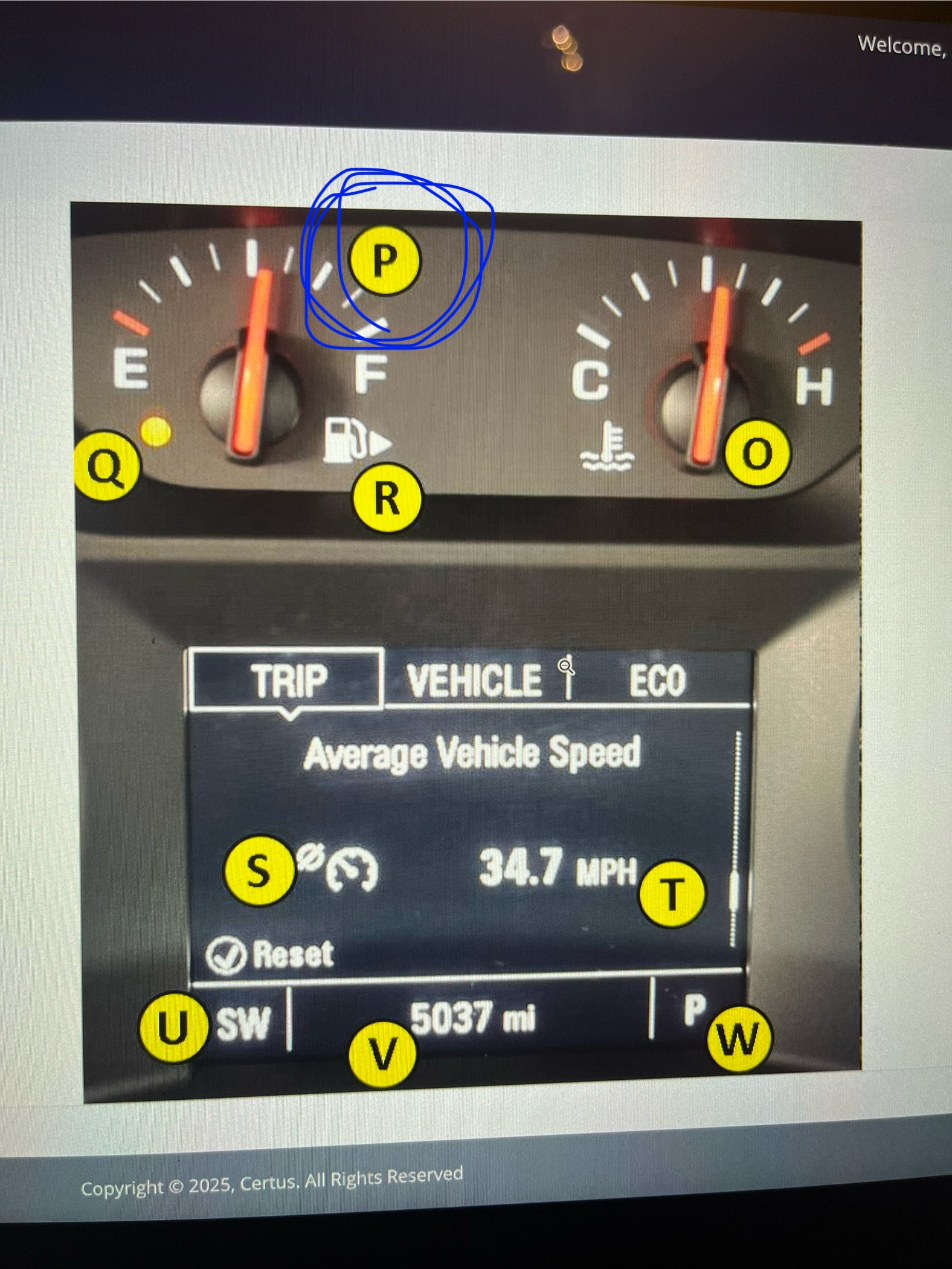
Low-fuel warning light (4)
This light comes on when the vehicle is low on fuel
Refuel as soon as possible, so the vehicle does not run out of fuel
Do not wait for the light to come on before refueling
A good rule of thumb is to refuel when you get down to ¼ tank of fuel remaining, or sooner
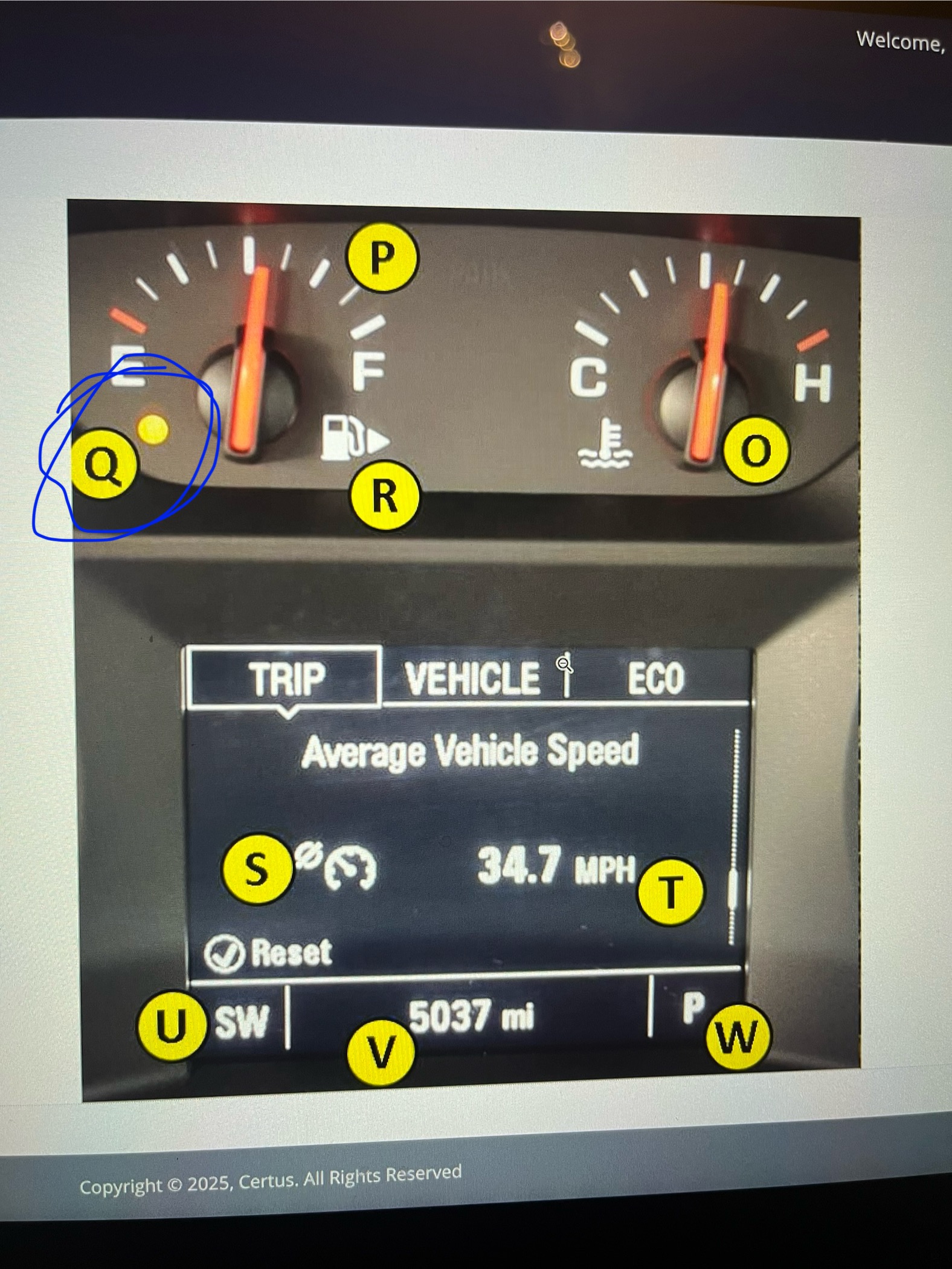
Fuel port location indicator arrow (5)
Some vehicles' fuel port (door) is on the left side of the car
Others are on the right side of the car
This arrow points to the side where the fuel port is located
Here, it tells the driver that the fuel port is on the right side
This is particularly helpful when driving a vehicle that is new to a driver (e.g., a rental car)
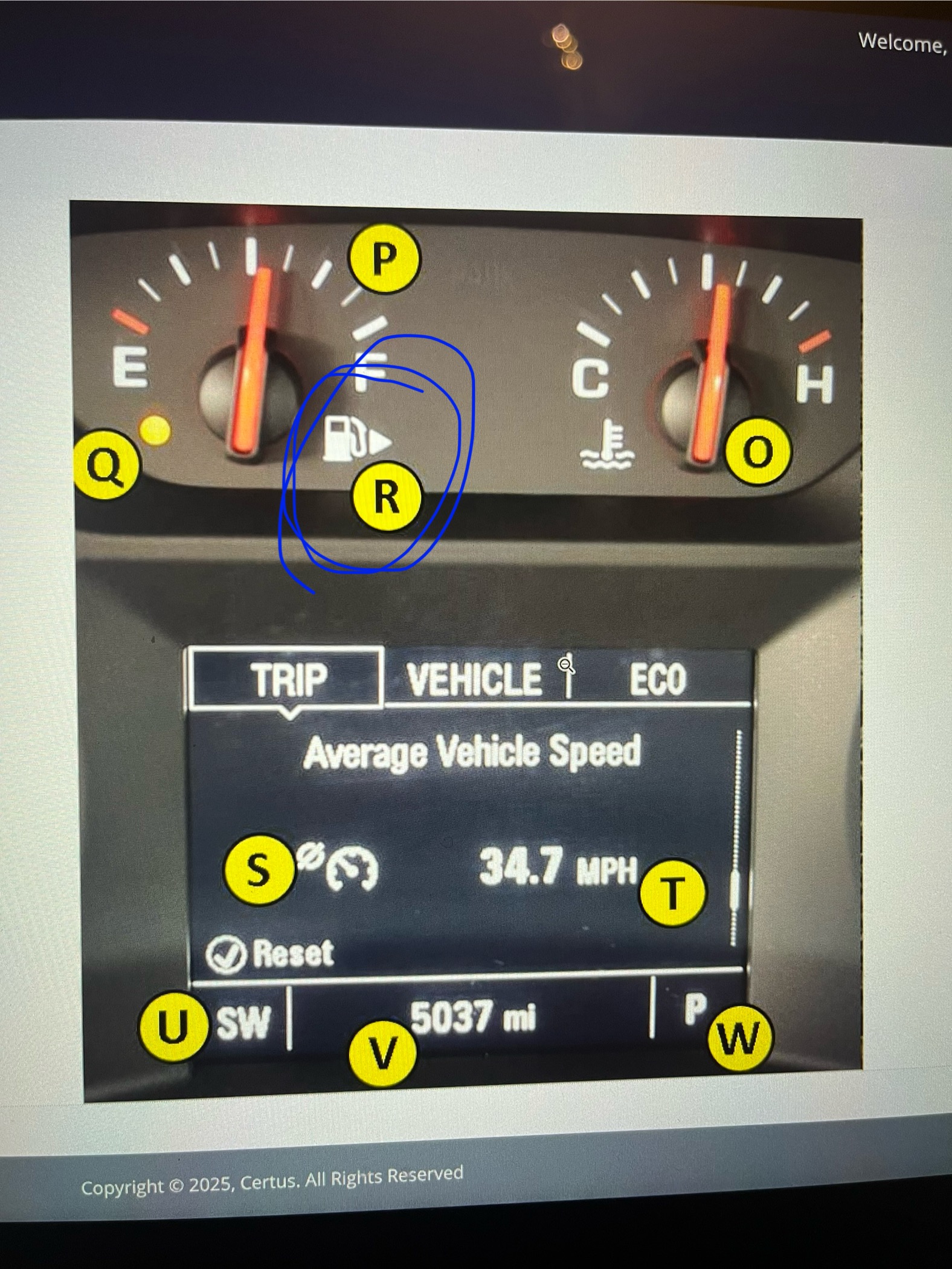
Cruise control on light (2)
Comes on when cruise control system is turned on, but not yet activated
Lets driver know they can activate cruise control
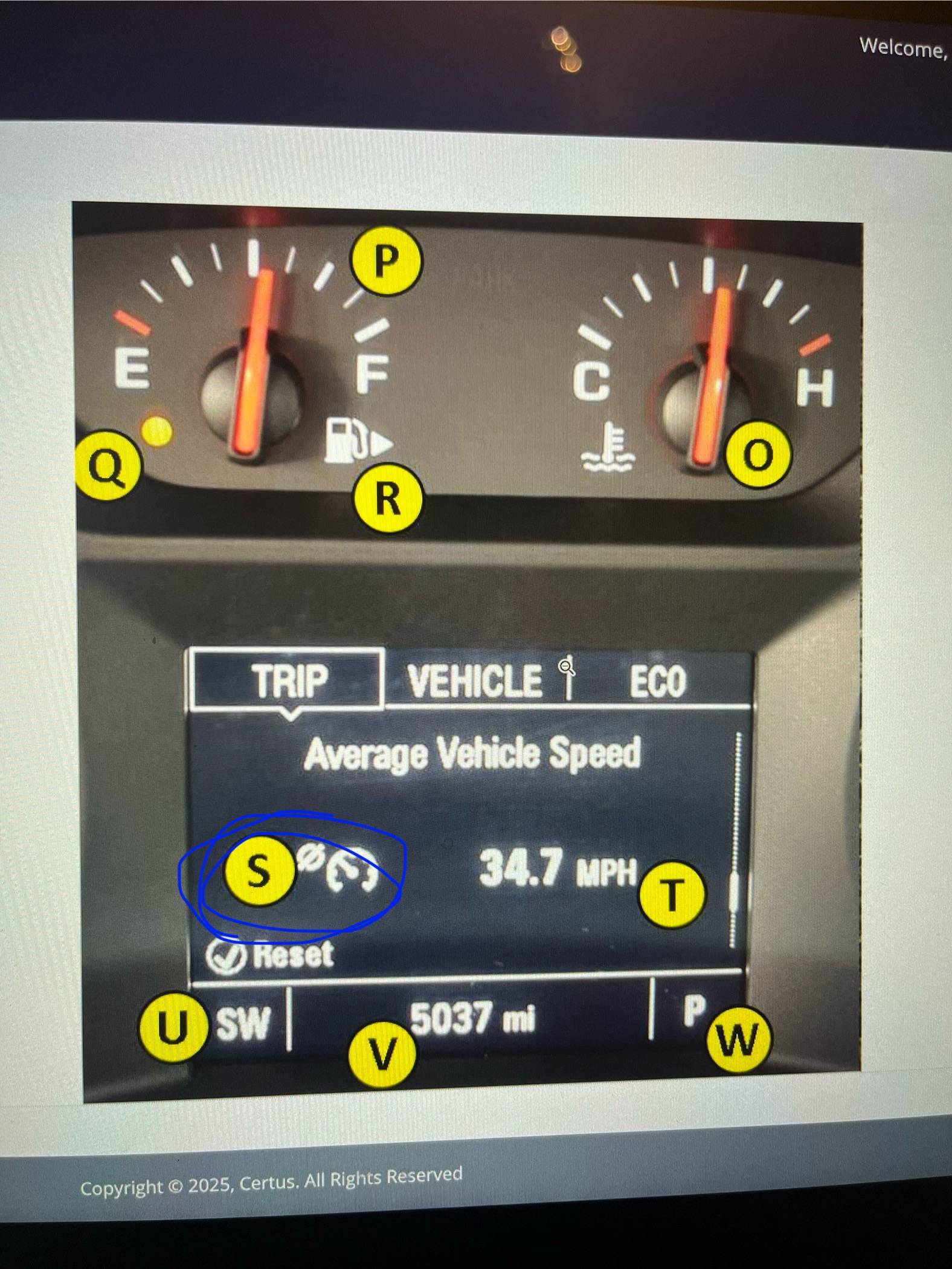
Average speed readout (5)
Some vehicles keep track of the average speed traveled
Some vehicles can also display useful information such as:
Average fuel economy
Numbers of miles that can be traveled on the remaining fuel
Outside temperature
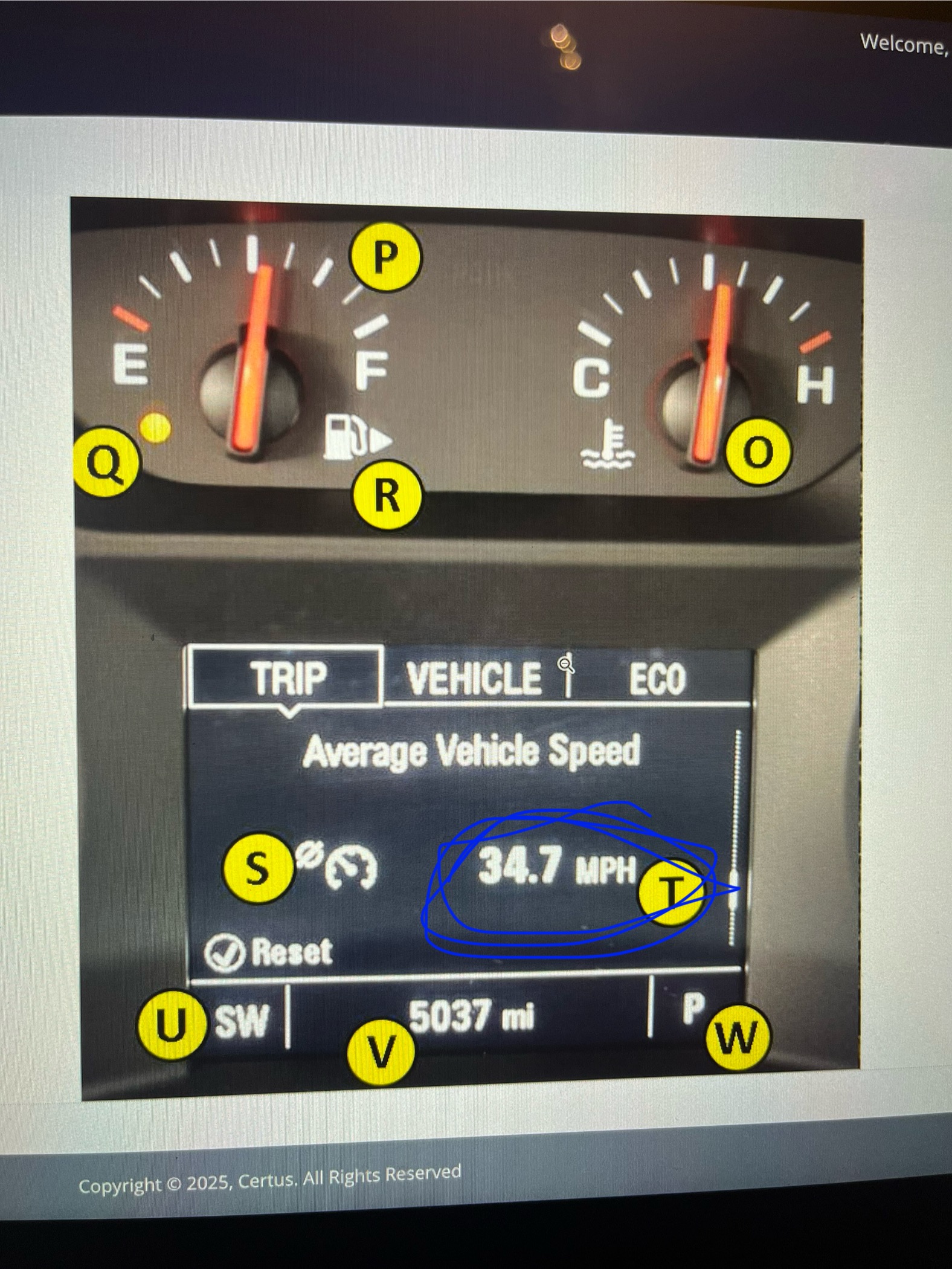
Compass (2)
Shows the cardinal direction in which the vehicle is headed-that is, north, south, east, or west
This compass reads "SW, which means the driver is heading in a southwesterly direction
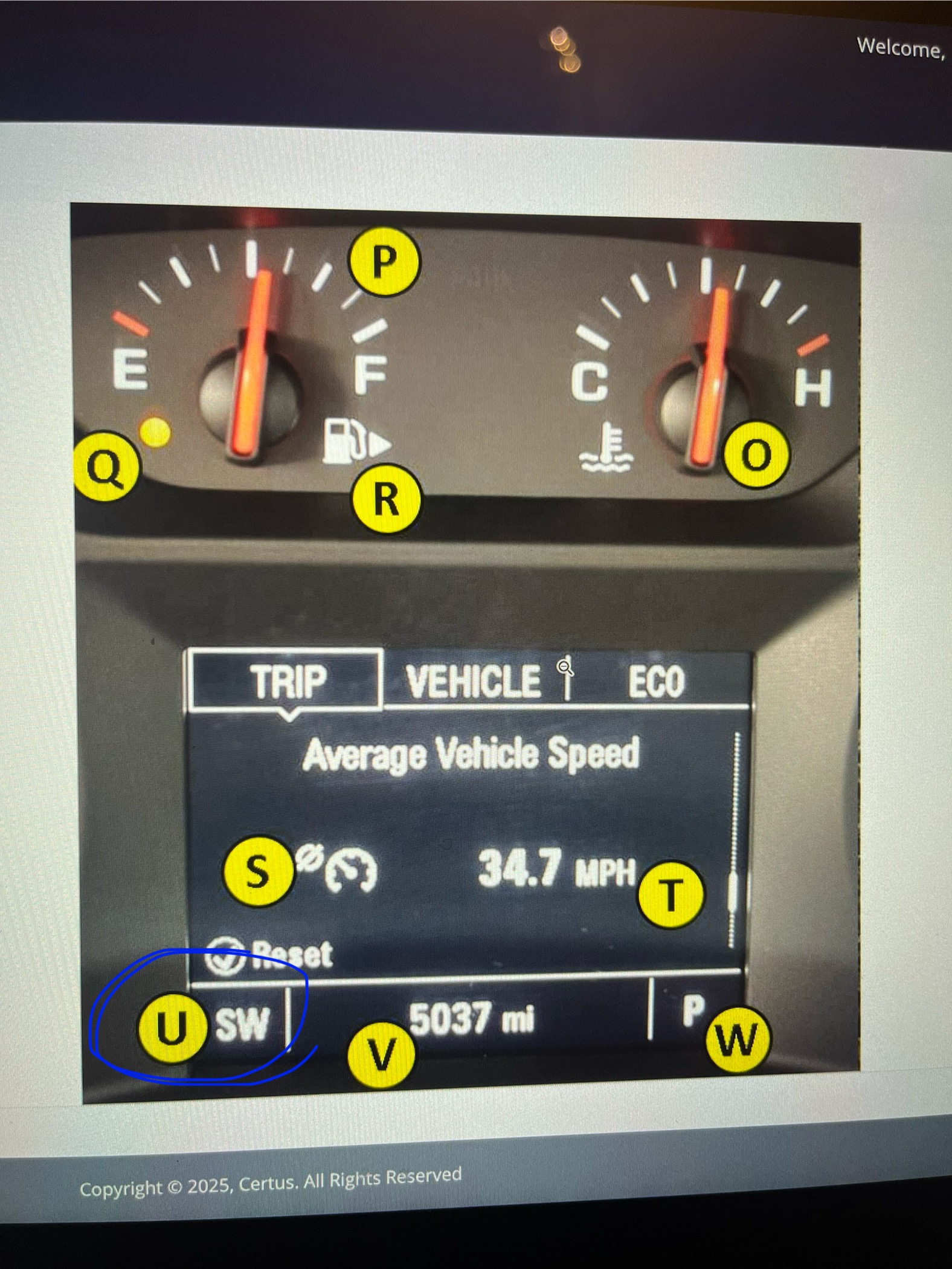
Odometer
Displays # of miles vehicle has traveled since new
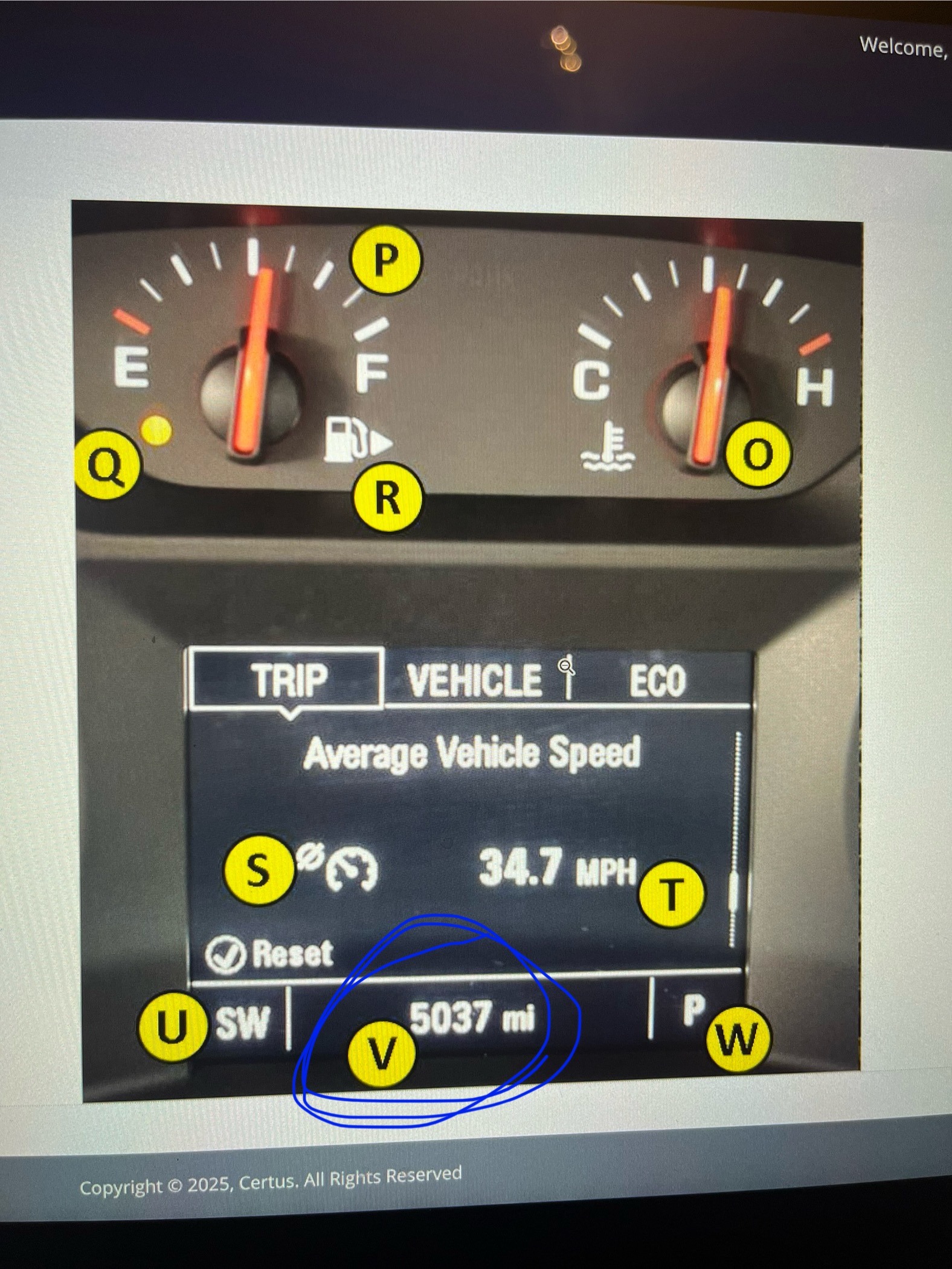
Gear selector indicator (2)
Shows which gear the transmission is in
This indicator shows that the vehicle is in "P," or Park
What adjustments should you make inside the vehicle prior to adjusting the mirrors? (3)
Seat
Steering wheel/column
Head restraints
When approaching your vehicle parked at a curb, you should (2)
Approach the driver's door from the front of your vehicle, facing oncoming traffic
Keep your finger on the alarm button, if your key fob has one
Risk of keyless ignition systems
Risk = carbon monoxide buildup
_____ is responsible for ensuring all passengers wear their seatbelts
The driver is responsible